That Christianity gives joy and breadth is also a thread that runs through my whole life. Ultimately someone who is always only in opposition could not endure life at all.
Distinction Matter - Subscribed Feeds
-
Site: RT - News
Moldova’s President Maia Sandu is refusing to include an autonomous region’s elected head in her cabinet, citing “criminal” links
Moldovan President Maia Sandu has refused to sign a decree appointing the head of the autonomous region of Gagauzia, Yevgenia Gutul, as a member of the government, as required by the country’s legislation.
This is according to news portal Gagauzinfo, citing a statement made on Monday by Sandu at a press conference in Moldova’s capital Chisinau.
Gagauzia, an autonomous region in southern Moldova, had elected Gutul – a member of the opposition Shor party – as its governor last May. Moldova’s constitutional court later ordered the dissolution of the party.
“A person who works for a criminal group and not for the citizens of Moldova and the residents of the autonomy, and who makes declarations against her own country, has nothing to do in the government of Moldova,” President Sandu reportedly said, also calling for a legislative assessment of Gutul’s statements.
Commenting on a recent visit to Russia by Gutul, the Moldovan president claimed that Moscow “has made it clear that it is relying on criminal groups to destabilize the situation in Moldova.”
Gutul traveled to Russia in February to ask President Vladimir Putin to support the region in the face of “illegal actions by Moldova’s authorities.”
Read more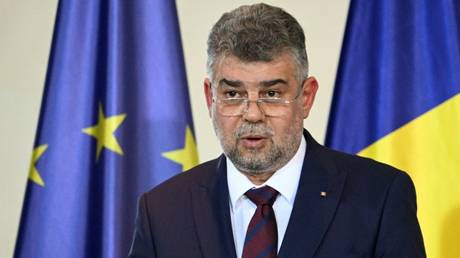 EU applicant is dependent on us – Romanian PM
EU applicant is dependent on us – Romanian PM
The 37-year-old head of Gagauzia has been increasingly at odds with the pro-EU Sandu since her election last year as the region’s leader. The refusal by the president to comply with a constitutional rule to include Gutul in the government was made on grounds of alleged irregularities in the election.
Moldova, a small nation of 2.6 million located between Ukraine and Romania, has taken a distinctly pro-Western course since Sandu came to power in 2020.
Sandu now plans to run for a second term in the presidential election this fall, promising to maintain her government’s pro-Western trajectory and to make the country a full-fledged member of the EU by 2030. She also claimed that “the regime in Moscow is seeking to control” her state through interfering in elections, even attempting a coup.
Russia has denied the allegations of meddling in the country’s affairs and accused Sandu of provoking anti-Russia sentiment.
-
Site: RT - News
At least eight people were reportedly killed as the Afghan militants traded cross-border fire with the Pakistani military
Afghanistan’s Taliban government accused Pakistan of killing eight civilians in an air raid on Monday. The Islamist group responded by opening fire on Pakistani targets, allegedly wounding seven people.
Pakistani jets “bombarded the homes of civilians” in the early hours of Monday morning, Taliban spokesman Zabihullah Mujahid said in a statement. Mujahid said that the bombing killed eight people in the provinces of Paktika and Khost, both of which border Pakistan.
The Pakistani Foreign Ministry did not comment on the alleged civilian casualties but said that the Pakistan Air Force had launched “intelligence-based anti-terrorist operations” against Taliban-sponsored terrorist groups operating in the two provinces. These groups include the Hafiz Gul Bahadur Group and Tehrik-i-Taliban Pakistan (TTP), which Islamabad says have used Afghanistan as a staging ground for attacks on Pakistani soil.
The Taliban denies sheltering the TTP. While Hafiz Gul Bahadur once led a Taliban faction in Pakistan, his current relationship with Kabul is unclear.
Read more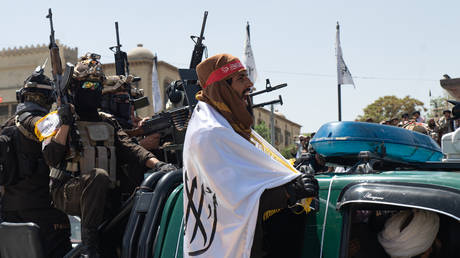 Taliban boycotts UN-sponsored meeting
Taliban boycotts UN-sponsored meeting
The most recent of these attacks was on Saturday, when a suicide bomber drove an explosives-laden truck into a military checkpoint in Pakistan’s Khyber Pakhtunkhwa province. A splinter group of the TTP claimed responsibility for the attack, which killed seven Pakistani soldiers.
Mujahid said that Taliban fighters responded to Monday’s airstrikes by targeting Pakistani military outposts with heavy weapons. Pakistani officials told Al Jazeera that three soldiers and four civilians were wounded by mortar fire.
“The Islamic Emirate of Afghanistan, which has a long experience of freedom struggle against the superpowers of the world, does not allow anyone to invade its territory,” the Taliban spokesman stated.
Although an American ally, Pakistan provided military and financial aid to the Taliban before and during the US invasion of Afghanistan. That relationship has since soured, with Pakistan fencing up its side of the Afghan border and deporting hundreds of thousands of Afghans late last year. Tit-for-tat killings have become commonplace along the frontier since 2022, with the Pakistani government accusing the Taliban of sheltering terrorists and Kabul accusing Islamabad of violating Afghan sovereignty.
READ MORE: Taliban winning war against opium trade – UN
Not a single country officially recognizes the Taliban government, which took power in Kabul in 2021 during the final stage of the withdrawal of US troops. The UN does not recognize the group’s authority over Afghanistan, and the Taliban has boycotted power-sharing talks in Qatar.
-
Site: RT - News
The billionaire shared a screenshot of a satirical story highlighting the mechanical troubles with the US aerospace giant’s aircraft
Elon Musk, CEO of Tesla and SpaceX, has ribbed US aerospace giant Boeing by sharing a story which jokes that passengers could bring sharp hand tools like screwdrivers aboard their flights to assist with maintenance.
The billionaire posted a screenshot from The Shovel, an Australian news satire site similar to The Onion, which declared that “Screwdrivers, drills now permitted on Boeing flights to allow passengers to help with maintenance.” The tongue-in-cheek story follows recent reports of mid-air malfunctions on Boeing airplanes.
Musk did not provide any description of the screenshot, which went viral after he posted it on his social media platform X (formerly Twitter) on March 17, receiving over 40 million views and 37,000 reposts. Internet users responded by posting their own memes exposing Boeing troubles.
— Elon Musk (@elonmusk) March 17, 2024
The US plane maker’s production standards have come under increased scrutiny worldwide following a mid-air blowout on one of its 737 MAX 9 planes in January.A US safety audit of Boeing’s 737 MAX 9 manufacturing process has reportedly found dozens of quality-control shortcomings, including the use of dish soap and a hotel key card as makeshift tools. The US Federal Aviation Administration (FAA) identified 97 “non-compliance” issues at Boeing and failed the aircraft maker on 33 out of 89 product audits, according to a recent New York Times report, citing relevant documents.
The safety review was ordered after a January 5 Alaska Airlines flight bound for California from Portland, Oregon, had to turn back after a door panel blew off at 16,000 feet, injuring several of the 171 passengers aboard. The FAA temporarily grounded all 737 MAX 9 jets in the US for safety inspections. Alaska Airlines said it has found loose bolts on many of the Boeing planes in its fleet.
READ MORE: Multiple ‘non-compliance issues’ exposed in Boeing safety audit – NYT
Boeing passenger jets have been involved in several safety incidents this month. A 737 MAX 8 operated by United Airlines rolled off a runway and tilted onto its side after landing in Houston on March 8. A day earlier, an Osaka-bound Boeing 777 operated by United was diverted after a tire fell off its landing gear upon takeoff in San Francisco. At least 50 people on a Boeing 787 operated by Latam Airlines were injured on March 11 when the jet – heading to New Zealand from Australia – went into a sudden nosedive, slamming passengers into the ceiling, because of what the air carrier described as a “technical event.”
The 737 MAX, Boeing’s top-selling airliner, was grounded by aviation regulators around the world in March 2019, after crashes in Ethiopia and Indonesia killed a combined 346 people. The planes were cleared to go back into service around two years later, following repairs to their flight control systems.
-
Site: RT - News
Prime Minister Marcel Ciolacu has said neighboring Moldova’s “only solution” is further integration with the bloc.
Romanian Prime Minister Marcel Ciolacu has endorsed Moldova’s pro-Western president’s reelection campaign, declaring that the former Soviet state would not exist without support from Bucharest.
Moldovan President Maia Sandu is seeking re-election this fall, promising to maintain her government’s pro-Western trajectory and make the country a full-fledged member of the EU by 2030. Despite just 22% of Moldova’s population expressing trust in Sandu, she is backed by multiple EU leaders, including Romanian Prime Minister Marcel Ciolacu.
Sandu’s reelection “is the only solution for the Republic of Moldova to continue to have a European route,” Ciolacu told Romania’s Digi24 news outlet on Sunday.
“I want to remind you that Romanians live in the Republic of Moldova, only Romanians,” Ciolacu continued. “This state is sustainable thanks to the involvement of the Romanian state and of Romania. I think it is our duty as Romanians to continue to support our Romanians from the Republic of Moldova.”
Read more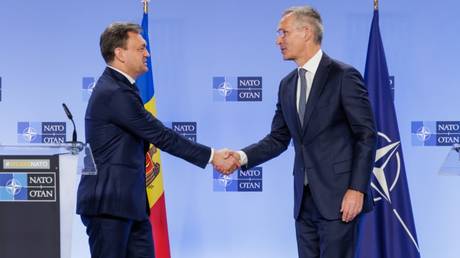 Majority in ex-Soviet state oppose joining NATO – poll
Majority in ex-Soviet state oppose joining NATO – poll
More than 80% of Moldova’s 2.5 million people speak Romanian as their mother language and roughly a quarter of the population hold Romanian passports. However, while Sandu has spoken favorably about the country’s eventual unification with Romania, around two thirds of Moldovans oppose the idea. A majority of Moldova’s population also opposes joining NATO, while only a slim majority supports EU membership, according to a poll carried out earlier this month.
Furthermore, the self-declared republic of Transnistria, located in eastern Moldova, is home to more than 200,000 Russian citizens. In 2006, 98% of Transnistrians voted to secede and pursue future integration with the Russian Federation.
Transnistrian legislators last month called on Moscow to take “measures to protect Transnistria amid mounting pressure from Moldova.” The Kremlin promised to “carefully consider” the request.
According to recent opinion polling, Sandu is nech-and-neck with socialist rival Igor Dodon, who favors closer relations with Russia. While Moldovans once associated Sandu with liberalization and prosperity, they now associate her with “poverty, arrogance, and anti-democratic abuse,” Dodon said in December.
-
Site: RT - News
Moscow has branded the West’s criticisms of the Russian presidential elections as both predictable and irrelevant
The Chancellor of Germany Olaf Scholz will not send a message of congratulations to Russian President Vladimir Putin on his re-election victory, which Berlin has branded as “undemocratic,” government spokeswoman Christiane Hoffmann told a media briefing on Monday.
Putin won the ballot by a wide margin, receiving 87% of the votes, according to the Russian Central Election Commission. This year’s vote also saw the highest turnout in Russia’s modern history, which surpassed 74%.
Hoffmann claimed that the vote was not democratic and “no real opposing candidates were allowed.” She went so far as to brand Russia a “dictatorship” ruled “in an authoritarian manner” by Putin, and added that Scholz shares such an assessment.
Russia’s election saw four candidates present on the ballot. Apart from Putin, who ran as an independent with support from three political parties, all other candidates were nominated by major parliamentary opposition parties: the left-wing Communist Party of Russia, the right-wing Liberal Democratic Party (LDPR) and the New People Party, which entered the State Duma in 2021.
Read more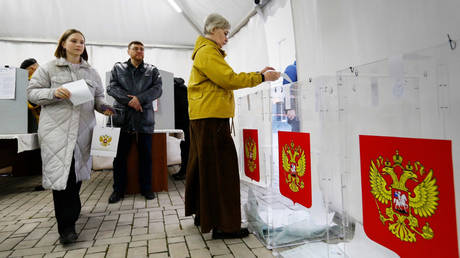 Putin brushes off Western election rebukes
Putin brushes off Western election rebukes
Berlin decried an alleged “climate of intimidation” and a lack of “freedom of expression” in Russia, as it justified Scholz’s decision not to congratulate Putin on his landslidevictory.
“We see this so-called election in Russia last weekend as neither free nor fair,” Hoffmann said, in a statement that was similar to one earlier offered by the US.
She claimed it was “extremely problematic” that votes were also held in the four former Ukrainian territories – the two Donbass republics as well the Kherson and Zaporozhye Regions – which joined Russia following a series of referendums in autumn 2022 that Kiev and its Western backers have not recognized.
The Russian national election of 2024 prompted a flurry of critical statements in the West, which were dismissed by Moscow as expected but irrelevant. “This is not an opinion for us to heed,” Kremlin spokesman Dmitry Peskov told journalists on Monday, referring to remarks made by Washington and other Western nations.
Earlier, Putin himself responded to Western criticism of the election results, calling them “predictable,” considering that those nations “are fighting against us, including with arms,” referring to the West’s constant stream of weapons deliveries to Ukraine.
-
Site: RT - News
Russia’s envoy urged the organization to force Kiev to abide by international rules
The obvious lack of a reaction to Ukrainian attacks on Russian cities demonstrated by the Organization for Security and Co-operation in Europe (OSCE) has encouraged Kiev to keep killing civilians, Moscow’s representative at the organization Alexander Lukashevich stated on Monday.
The comments came as Ukraine intensified its attacks on Russia’s border regions last week ahead of the country’s presidential election, which took place Friday through Sunday. The attacks involved drone raids, artillery strikes and attempted ground incursions. The assaults on Russia’s Belgorod Region alone have claimed the lives of 11 civilians, including children; 82 more were injured, according to the local health authorities.
“The OSCE leadership is once again demonstrating biased approaches, continuing to divide people into categories and sorts and blatantly ‘not noticing’ the victims of attacks carried out by the armed formations of the Kiev regime against peaceful residents of the Russian regions,” Lukashevich said in a statement posted on the official Telegram channel of the Russian mission.
The official highlighted that the OSCE leaders had offered nothing but “politicized statements” to back Kiev’s criminal regime, accusing the organization of demonstrating hypocrisy that “goes beyond all possible boundaries.”
Lukashevich also urged OSCE Chairperson-in-Office Ian Borg and Secretary General Helga Schmid to immediately condemn the intense, indiscriminate shelling of Russian cities by Ukrainian militant groups.
READ MORE: OSCE violating its mandate – Moscow
According to the envoy, the organization must call on the Ukrainian authorities and their sponsors from NATO to stop killing civilians, and immediately choose a political and diplomatic path to resolve existing tensions instead.
“Silence and inaction by the OSCE leadership now will mean not only encouragement of attacks by the Kiev regime against the civilians of the Russian Federation, but also its personal responsibility for further armed escalation,” the diplomat concluded.
-
Site: RT - News
A 33-year-old woman surveilled a Russian ship unloading ammonia at a “sensitive site” in Normandy, France, Journal du Dimanche reports
French law enforcement have arrested a suspected Ukrainian spy who used a drone to snoop on a Russian merchant ship transporting fertilizers in the northern part of the country, Le Journal du Dimanche reported on Friday.
According to the newspaper’s sources within the police, a 33-year-old Ukrainian female was taken into custody after she remotely flew an unmanned aerial vehicle over the Borealis chemical plant in the Normandy riverside town of Grand-Quevilly, about 80 kilometers from the coast. The facility itself, which was described by the paper as “sensitive,” specializes in the production of fertilizers.
The report said that the suspected spy – allegedly acting on behalf of Ukraine – was particularly interested in the “disembarkation of 11,000 tonnes of ammonia from a Russian cargo ship.” It also claimed that the woman was apprehended shortly after she was spotted by security guards at the facility, who called the police.
Read more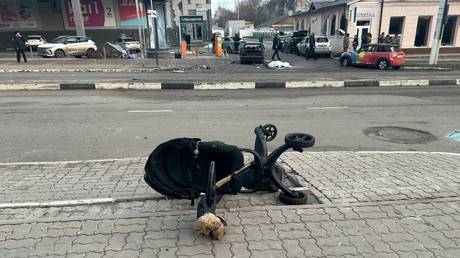 11 dead after week of Ukrainian strikes on Russian region – official
11 dead after week of Ukrainian strikes on Russian region – official
No information on the suspect's possible relationship with Kiev, on what punishment she might face or details about the Russian ship were provided.
Russia is one of the world’s leading producers of ammonia, a substance that plays a crucial role in fertilizer production, which significantly improves crop yields. The issue of ammonia exports has come into the spotlight on several occasions during the Ukraine conflict, particularly after the key Tolyatti-Odesa ammonia pipeline was severely damaged in Kharkov Region. Moscow and Kiev have traded accusations over the incident.
While the EU’s unprecedented sanctions against Russia over the Ukraine conflict target a wide range of goods, Moscow’s fertilizer exports have largely escaped any restrictions, provided that sanctioned persons are not involved. The bloc’s sanctions also do not prohibit EU states from granting port access to Russian-flagged vessels for the purposes of importing or transporting agricultural products, including fertilizers and wheat.
Despite recurring calls for the EU to become less dependent on Russian agriculture products, nitrogen imports into the bloc increased by 34% in 2022-23 compared to the previous period, with Russia accounting for around a third of the total growth, according to Eurostat.
-
Site: RT - News
Beijing is considering taking part in event, according to its ambassador in Bern
China is examining the possibility of taking part in a proposed Swiss-hosted peace conference on the Ukraine conflict, Beijing’s ambassador to Bern, Wang Shihting, told the daily Neue Zuercher Zeitung on Monday.
Last month, Switzerland announced plans to organize a peace summit, which would take place “by the summer.” No specific date has been set, nor has a list of participants been revealed. However, Ukraine has indicated that Russia can only be invited if it agrees in advance to a litany of preconditions.
Beijing has reportedly been pushing to have Moscow invited to the peace talks, with Wang saying on Monday that all parties must be involved to end the ongoing conflict.
“The crisis must be prevented from getting even worse, or even getting out of control,” the envoy said, noting that China has already put forward a strategy for a political end to the conflict, and adding that Beijing has been following the Swiss proposal and is considering taking part.
“The territorial sovereignty of all countries must be respected, and the UN Charter must be adhered to,” Wang stressed. “We should support Russia and Ukraine resuming direct dialogue as quickly as possible so that the situation can be gradually de-escalated,” the diplomat recommended.
Moscow has called the proposed peace conference plan “pointless” and indicated it has no intention of participating, even if officially invited.
Russian Foreign Ministry spokeswoman Maria Zakharova said last week that the proposed forum would be dedicated to the promotion of the ‘Zelensky peace formula’ which Moscow has panned as unrealistic.
Read more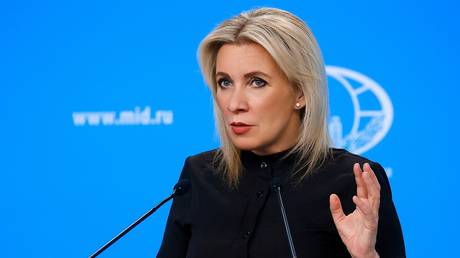 Russia says no to Switzerland ‘peace conference’
Russia says no to Switzerland ‘peace conference’
Zelensky’s plan includes the full withdrawal of Russian troops and a return to Ukraine’s 1991 borders, holding Moscow accountable and forced to pay reparations, among other conditions. Kiev’s basic demands remain the same, while legitimate Russian interests are being ignored, according to Zakharova. She insisted that Switzerland has “lost” its neutral status and cannot serve as a platform for peacekeeping efforts.
Ukraine’s Western backers insist that a peace settlement can only be achieved on Kiev’s terms and have vowed to continue weapons deliveries for “as long as it takes.” Russia, meanwhile, has stressed that no amount of foreign aid will change the course of the conflict.
Peace negotiations between Moscow and Kiev were held in Istanbul in the spring of 2022 but broke down, with each side accusing the other of making unrealistic demands. Russian President Vladimir Putin has since said that the Ukrainian delegation had initially agreed with some of Moscow’s terms, but then abruptly reneged on the deal.
The Kremlin has said that it remains open to discussions, but only if Kiev recognizes the “reality on the ground.”
-
Site: RT - News
The country’s top spy is en route to Qatar for ceasefire talks with the militants
Mossad chief David Barnea is traveling to Qatar to continue ceasefire negotiations with Hamas, but will not accept a deal proposed last week by the Palestinian militants, Israel’s i24 News reported on Monday.
Barnea, who heads the Israeli intelligence agency, will seek to renegotiate the “bad” deal put forward by Hamas, i24 reported, citing government sources. These same sources stressed that a new agreement is unlikely to be reached in Doha, with Hebrew news site Ynet quoting other government sources as saying that Barnea’s team had requested “a significant amount of time” to draft a new arrangement.
Hamas announced on Friday that it had presented its ceasefire “vision” to Qatari and Egyptian mediators. Reuters later revealed details of the Hamas proposal, which it said envisages a two-stage road-map toward ending the fighting.
Hostilities would be paused during the first stage to allow the militants to release Israeli women, children, elderly, and sick hostages, in exchange for Israel freeing between 700 and 1,000 Palestinian prisoners from its jails, the news agency reported. With the exchange completed, a deadline for an Israeli withdrawal and permanent ceasefire would be agreed, after which all detainees from both sides would be released in the second stage of the plan.
Read more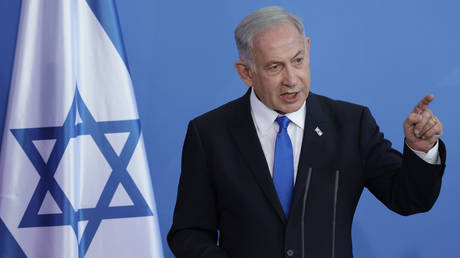 Israeli PM approves Rafah operation plan
Israeli PM approves Rafah operation plan
In a social media post later on Friday, Israeli Prime Minister Benjamin Netanyahu’s office described Hamas’ demands as “unrealistic.” Netanyahu has maintained for months that Hamas must be completely “eliminated” and its members prevented from having any say in governing post-conflict Gaza.
Netanyahu’s office also said on Friday that he had approved plans to attack the city of Rafah in southern Gaza. With more than a million Palestinians driven into Rafah by Israeli attacks on other parts of the enclave, an assault on the city “could lead to a slaughter” of civilians, the UN has warned.
Israel has been waging a relentless air and ground campaign against Gaza for more than five months, following Hamas’ surprise attack on the Jewish state on October 7, which saw 1,100 people killed and 250 taken hostage. Israeli forces have since killed nearly 32,000 Palestinians, most of them women and children, according to the latest figures from the Gaza Health Ministry.
-
Site: RT - News
The pardoned ex-lobbyist could be given a fundraising role for the presumptive Republican presidential nominee, sources have claimed
Donald Trump could hire former lobbyist Paul Manafort for his presidential election campaign, sources have told the Washington Post. Manafort was convicted of bank fraud and tax evasion in 2018 after being linked to the ‘Russiagate’ saga, before being pardoned by Trump as he was leaving office.
Citing anonymous sources, the newspaper reported on Monday that presumptive Republican nominee Trump appreciates Manafort’s personal loyalty and intends to entrust him with raising funds for his bid for a White House return in November’s election.
The move, however, “would likely revive discussion of Russia’s involvement in the 2016 election,” the Post claimed. Manafort formerly served as chairman of Trump’s 2016 campaign before being dismissed over allegations of illegal lobbying.
He had spent years as a Republican operative before becoming a lobbyist for foreign clients. Manafort was later accused of neglecting to register as foreign agent and fraudulently hiding profits from the US tax authorities.
Read more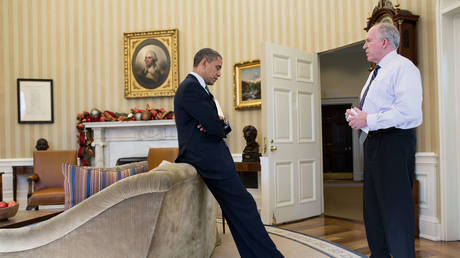 US spies behind ‘Russiagate’ conspiracy – report
US spies behind ‘Russiagate’ conspiracy – report
Manafort emerged as a key target for attacks on the Trump campaign in 2016 due to the fact that Viktor Yanukovich, the Ukrainian president ousted in 2014 in the US-backed armed coup in Kiev, had been among his clients.
Western media widely described Yanukovich as “pro-Russian” due to his voter base in the predominantly ethnic-Russian eastern part of Ukraine and his reluctance to integrate with the EU at the expense of tariff-free trade with Moscow.
Yanukovich employed Manafort’s services to improve his government’s standing with the West. The American engaged the bipartisan lobbying apparatus in Washington, working with major firms such as the Podesta Group, which is closely linked to the Democrats. Co-founder John Podesta had a senior position in Hillary Clinton’s 2016 campaign.
Manafort came to the attention of special counsel Robert Mueller, who was charged with investigating alleged Russian interference in the 2016 US presidential vote. While the probe failed to produce charges against Trump for supposedly colluding with Moscow, Manafort’s conviction was played up by media hostile to the then-president as circumstantial evidence that such a link existed.
READ MORE: Trump plans to ‘reform’ CIA and FBI – Politico
Trump pardoned Manafort in December 2020, just as his term in office was about to end. The Republican publicly praised his “brave” former campaign staffer in an interview in 2018, comparing him favorably to another ex-associate, long-time personal lawyer Michael Cohen. The same month, Cohen pleaded guilty to campaign finance violations related to payouts to adult film actress Stormy Daniels over an alleged affair she had with Trump.
-
Site: RT - News
The facility in Romania will be “the size of a small town,” Euronews has reported
Romania has started work on rebuilding an airbase that will become the largest NATO facility in Europe, according to Euronews. The base is located near the city of Constanta on the Black Sea, around 130km from the border with Ukraine.
When the expansion of the Mihail Kogalniceanu Romanian Air Force 57th Air Base is complete, it will be able to permanently host around 10,000 NATO servicemen and their family members, the broadcaster reported on Saturday.
"In the new geopolitical context, with a war on the border, the development of the base thus strengthens NATO’s eastern flank,” Euronews said, referring to the conflict between Russia and Ukraine.
The extensive project, which will cost Bucharest €2.5 billion ($2.7 billion), includes a new runway, aircraft hangars, fuel depots, and ammunition stores, it said. The base will also feature accommodation for personnel, schools, kindergartens, shops, and even its own hospital.
Read more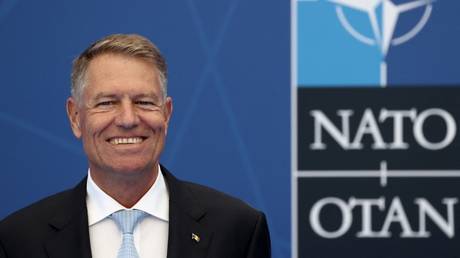 Romanian president enters race for NATO leadership
Romanian president enters race for NATO leadership
The facility is located at the Mihail Kogalniceanu International Airport near the port city of Constanta on the Black Sea. There are currently 5,000 NATO soldiers, mainly American, stationed at the facility.
The basic infrastructure for the expansion is being set up on site, Euronews said, adding that the eventual plan is to connect the existing runway at the base with a new one and to link it with the infrastructure of the international airport.
It did not provide a deadline for the completion of the project.
Moscow has consistently warned the US and its allies against NATO’s eastward expansion and military buildup near Russia’s borders. Preventing Kiev from joining the bloc was among the main goals of the military operation launched against Ukraine in 2022, the Russian leadership has explained.
READ MORE: Troops from NATO states operating in Ukraine – Putin
Russian President Vladimir Putin said on Sunday that he “doubts that anyone is interested” in a direct military confrontation between Moscow and NATO, as that scenario would mean “we’ll be one step away from World War III.” He cautioned, however, that “everything is possible in the modern world.”
-
Site: RT - News
The Chinese leader says he is sure that Russia will be able to achieve even more success under the president’s continued rule
Chinese leader Xi Jinping has congratulated his Russian counterpart Vladimir Putin on his historic landslide victory in Russia's presidential election, which has paved the way for his fifth term in office.
According to the Central Election Commission, with almost all ballots counted, Putin had 87% of the votes. Voter turnout, unprecedented in the country’s modern history, exceeded 77%.
In a letter quoted by Beijing’s foreign ministry on Monday, the Chinese leader noted that Putin’s victory is proof that he enjoys the support of the Russian people, and expressed confidence that under his leadership, Russia “will be able to make greater achievements in national development.” Xi added that China attaches great importance to vibrant bilateral ties.
Meanwhile, Chinese Foreign Ministry spokesman Lin Jian said that Beijing hoped that Russian-Chinese cooperation “will continue to move forward” under the strategic guidance of the two residents. “China and Russia are each other’s largest neighbors and comprehensive strategic partners in the new era,” Lin added.
Read more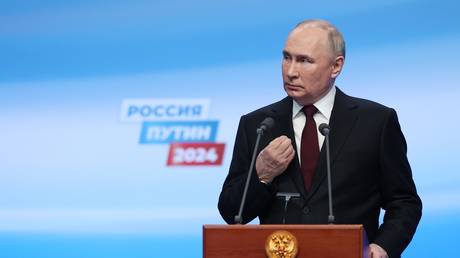 Putin’s dream, Russian unity, conflict with NATO: Key takeaways from victory speech
Putin’s dream, Russian unity, conflict with NATO: Key takeaways from victory speech
During his victory speech on Sunday night, Putin pointed out that Russia-China ties are a “stabilizing factor” for the entire framework of international relations, expressing hope that these bonds would be maintained, in no small part due to “our good personal relationship with the president of the People’s Republic of China.”
The two countries have for decades enjoyed close economic and political ties, with Beijing refusing to support unprecedented Western sanctions against Russia over the Ukraine conflict. The deep partnership between the two countries was further underscored by Xi’s historic visit to Moscow last March. Putin reciprocated, traveling to Beijing in October.
Xi was not the only world leader to congratulate Putin on his re-election. He was joined by Iranian President Ebrahim Raisi, North Korean leader Kim Jong-un and a host of leaders from post-Soviet republics, the Caribbean, and Latin America. Western countries have not sent any congratulatory messages to Putin amid the stand-off over Ukraine, with many calling the election “unfair,” a charge denied in Moscow.
However, Leonid Sevastyanov, the head of the World Union of Orthodox Old Believers, who says he is in contact with Pope Francis, noted that the pontiff had also congratulated Putin on his landslide victory.
-
Site: RT - News
A Swedish journalist suggested that Ukrainian women stand out at brothels during a satirical show about immigrants
Kiev’s envoy to Stockholm was infuriated by a talk show which was aired by the public broadcaster SVT last week in which a journalist, Elaf Ali, poked fun at Ukrainian prostitutes. Ali later responded to the complaints by suggesting that Ukrainians should get thicker skin.
Andrey Plakhotnyuk said Ali’s remarks were “deeply offensive and completely unacceptable.” He demanded a public apology, both from her and SVT, venting his anger in a post on X (formerly Twitter) on Friday.
The condemnation was over the first episode of a new immigration-themed satirical show, where Ali was one of the guests. Host Ahmed Berhan was testing participants’ knowledge of migrant communities in Sweden.
Ali’s joke came in response to a question about which country’s nationals received the most residency permits in Sweden in 2022. That year, hostilities between Moscow and Kiev triggered a mass exodus of Ukrainians, both into Russia and the European Union.
Read more Ex-Soviet state orders closure of ‘all brothels’
Ex-Soviet state orders closure of ‘all brothels’
The journalist mused that since many Ukrainians are blonde and blue-eyed, the influx was hardly noticeable in the Nordic nation, except in brothels. Most people who claimed asylum in Sweden in the past decade come from the Middle East, including Syria, Iraq (Ali’s home country), Iran and Afghanistan, as well as Somalia in Africa, according to national statistics.
The journalist responded to criticisms with a short statement, noting that of the three targets of her jokes during the show, who were an imam living in the Swedish city of Malmo, Ukrainians and Somalis, only the Africans didn’t attack her later online. They may have not watched the episode, she added.
Ali also shared a post defending herself, which explained the joke: “We are more willing to open our country to Ukrainian refugees than to others fleeing from war, but at the same time … we treat them as badly as others.”
SVT said disciplinary action against the journalist was out of the question, since her speech was protected by Swedish law. The show is meant to satirize stereotypes about ethnicity and culture in a way that is “on the fringe of what is socially acceptable,” editor Christina Hill said.
READ MORE: EU state may conscript women
Stockholm pioneered a scheme in 1999, under which prostitution is legal, but the purchase of sex is criminalized. Women selling sex are mostly foreigners, according to the national agency which is tasked with tackling prostitution and human trafficking. Sweden’s policy is that prostitution is always a form of exploitation and should not be regarded as a profession.
-
Site: RT - News
The reported test comes after Pyongyang decried the latest joint drills held by the US and South Korea
North Korea fired multiple short-range ballistic missiles into the East Sea on Monday, the Yonhap News Agency has reported, citing senior South Korean military officials. The launches were carried out as US Secretary of State Antony Blinken arrived in Seoul for a state visit.
The ballistic missile tests, Pyongyang’s first in two months, were detected between 7:44am and 8:22am local time, the South Korean Joint Chiefs of Staff (JCS) stated. The missiles traveled around 300km and landed in the East Sea (also known as the Sea of Japan), they added.
“North Korea fired at least three missiles, and their trajectories were similar to those of [the] KN-24,” a senior military official was quoted as saying. The KN-24 is a solid-fuel ballistic missile with a range of up to 410km and an estimated payload of 400-500kg.
“We strongly condemn North Korea’s latest missile launch, which is a clear provocation that seriously threatens peace and stability on the Korean Peninsula,” the JCS said.
The Defense Ministry in Tokyo confirmed the launch, saying all three missiles had traveled about 350km before landing in waters outside Japan’s exclusive economic zone, which extends 370km from the coast. Prime Minister Fumio Kishida condemned the tests, adding that Japan was analyzing them while working with the US and South Korea.
Read more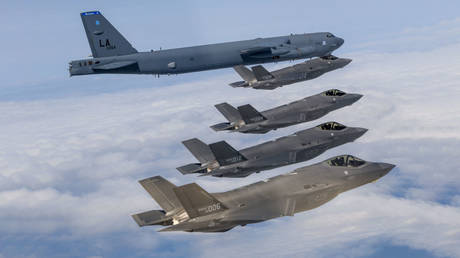 North Korea condemns latest US-South Korea drills
North Korea condemns latest US-South Korea drills
The launches come after South Korea and the US wrapped up large-scale annual joint military drills earlier this month. The 11-day Freedom Shield exercises on the Korean Peninsula reportedly involved twice the number of troops compared to 2023 and carried out roughly double the number of field-training drills.
North Korea branded the exercises “reckless” and a “further escalation of military threats,” claiming they were preparation for “an invasion attempt.” Earlier this month, Pyongyang warned the US and South Korea to stop any further “provocative and destabilizing” actions, adding that “a nuclear war may be ignited even with a single spark.”
Blinken arrived in Seoul on Monday to attend the Summit for Democracy conference hosted by President Yoon Suk Yeol. The event, an initiative of US President Joe Biden, is reportedly aimed at discussing ways to stop democratic backsliding and the erosion of rights and freedoms worldwide. Blinken is expected to meet his South Korean counterpart, Foreign Minister Cho Tae-yul, during the visit.
Think your friends would be interested? Share this story!
-
Site: RT - News
Germany, Italy, Spain, and Belgium reported the largest shortfalls last year, according to research
European members of NATO are €56 billion ($61 billion) short of meeting the US-led bloc’s minimum defense spending target, research for the Financial Times by Germany’s Ifo Institute has suggested.
Washington accounted for two-thirds of NATO’s $1.3 trillion total spending in 2023, more than double the $393 billion jointly contributed by EU countries and the UK and Norway, the newspaper outlined on Saturday.
According to the research, Germany, Italy, Spain, and Belgium were the furthest from meeting the bloc’s goal of investing 2% of GDP in defense, which NATO members agreed in 2014 following the outbreak of hostilities in Ukraine and Crimea’s reunification with Russia.
Berlin spent $15.2 billion less than required last year, while Rome, Madrid, and Brussels were $12 billion, $11.7 billion, and $5.1 billion behind respectively, Ifo’s figures suggested.
Italy, Spain, and Belgium were among the six EU nations with debt above 100% of their GDP last year, the FT noted.
Read more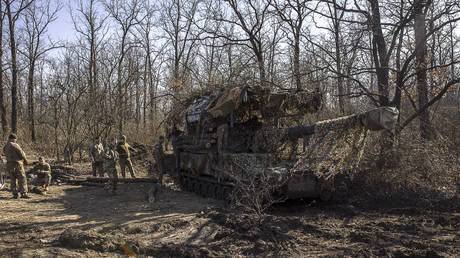 Troops from NATO states operating in Ukraine – Putin
Troops from NATO states operating in Ukraine – Putin
The research showed that the overall shortfall in NATO spending by European countries has reduced by half over the past decade. The bloc has stated that it expects 18 of its 32 members to meet the 2% benchmark in 2024.
Ifo economist Marcel Schlepper told the FT that some members might find it difficult to boost spending to the required level amid slowing economic growth in the EU.
“Countries with high debt levels and high interest costs do not have much room to raise more debt, so the only real way to do it is to cut spending in other areas,” Schlepper explained. “This is not easy, as we saw when Germany tried to cut subsidies on agricultural diesel and the farmers came out in protest.”
Former US leader Donald Trump, who pushed hard for EU countries to contribute more to NATO during his presidency, warned last month that he “would not protect” from Russia any members that fail to meet the 2% spending goal, should he win a second White House term in the November election.
“I said you didn’t pay, you’re delinquent… In fact, I would encourage them to do whatever the hell they want. You got to pay your bills,” Trump stressed.
READ MORE: Zelensky ‘one of the greatest salesmen in history’ – Trump
Russian President Vladimir Putin said on Sunday that he “doubts that anyone is interested” in a direct military confrontation between Moscow and NATO, as that scenario would mean “we’ll be one step away from World War III.” He cautioned, however, that “everything is possible in the modern world.”
-
Site: RT - News
The Russian leader has called the political situation in America a “catastrophe”
The US has become a global laughing stock by criticizing democratic processes in other nations while suppressing a presidential candidate in its own election, Russian leader Vladimir Putin has claimed.
Speaking to journalists in Moscow early on Monday morning, shortly after preliminary results indicated he would be reelected with 87% of the vote in the Russian presidential election, Putin stated that the “whole world is laughing at what is happening” in the US.
“We are behaving with more restraint than their opponents in other countries, but this is just a catastrophe, not a democracy – that’s what it is,” the Russian leader added.
Putin claimed that the current US administration is using all its resources to attack a candidate for this year’s presidential election, seemingly referring to Donald Trump. The former US leader is facing a litany of lawsuits despite being the presumptive Republican nominee for the vote in November.
Read more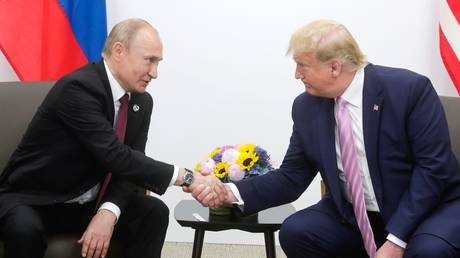 Putin recalls how Trump asked him about ‘Sleepy Joe’
Putin recalls how Trump asked him about ‘Sleepy Joe’
In a pre-election interview earlier this week, Putin insisted that Russia does not meddle in foreign elections and will work with any elected US president.
“I think it’s obvious to everyone that the American political system cannot claim to be democratic in any sense of the word,” he said in an interview with journalist Dmitry Kiselyov. Putin refused to comment further on the current presidential campaign in the US, but described the atmosphere as becoming “increasingly uncivilized.”
-
Site: RT - News
The White House should stop giving Kiev cash and start lending it, the former US president has insisted
Donald Trump, the 2024 Republican presidential frontrunner, has claimed that Vladimir Zelensky is one of the “greatest salesmen” he has ever known, as the Ukrainian head of state manages to leave Washington with pockets full of cash every time he visits the US.
During a campaign rally in Vandalia, Ohio on Saturday, Trump also shared his views about providing billions of dollars in support to Kiev. The former president reiterated his earlier idea that the US should lend money to Kiev instead of simply handing it over.
“We should loan them the money, not send them the money, so that if they do make it - they are against tremendous odds - they pay us back,” Trump said. “Loan them the money, let them be a little bit like they have to be a little nice... Loan them the money, don’t just hand them a check for $60 billion,” he exclaimed.
“I tell you, Zelensky is one of the greatest salesmen in history. Every time he comes to the country, he walks away with $50 or $60 billion,” Trump said.
“I’ve never been able to do that. He's a much better salesman than me,” he added.
Since the beginning of the conflict between Russia and Ukraine in February 2022, Washington has been Kiev’s primary backer, having provided it with around $113 billion in military, economic, and humanitarian aid.
Read more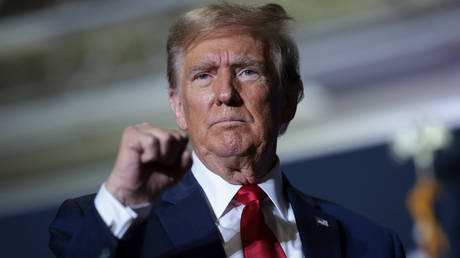 Trump could force Ukraine to make peace – Bloomberg
Trump could force Ukraine to make peace – Bloomberg
Trump, US President Joe Biden’s presumptive Republican challenger in this November’s election - said last week that NATO countries “laugh at the stupidity of the United States” for spending so much money on Ukraine, and must “pay their bills.”
Biden is currently pushing Congress to pass a $95 billion foreign aid bill that includes more than $60 billion worth of additional military aid for Kiev. He has claimed that Ukraine would lose more territory to Russia if the bill is not approved. The administration’s request - which was greenlit by the Senate - has stalled in Congress because of Republican opposition.
On Tuesday, the Biden administration said that Washington would send a new military aid package to Ukraine worth $300 million.
The White House also looked at options for seizing some $285 billion in Russian assets frozen in 2022 and using the money to purchase Ukraine weaponry.
-
Site: RT - News
The final day of the Russian presidential election coincides with the anniversary of the utterly meaningless move against the incumbent
One year ago, on 17 March 2023, the International Criminal Court (ICC) issued two politically important – to put it neutrally – arrest warrants, one for Russian President Vladimir Putin, and the other for Maria Lvova-Belova, the Commissioner for Children’s Rights, a position within the Office of the President.
The warrants reflected that the ICC, to be precise its Pre-Trial Chamber following the court’s Prosecutor Karim Khan, found what it considered “reasonable grounds to believe that President Putin and Ms. Lvova-Belova bear criminal responsibility for the unlawful deportation and transfer of Ukrainian children from occupied areas of Ukraine to the Russian Federation.” Khan further argued that “these acts… demonstrate an intention to permanently remove these children from their own country.” In sum, the arrest warrants depicted an extensive kidnapping operation during wartime.
Public – and published – opinion in the West preponderantly celebrated the warrants as not only justified but salutary. They were supposed to promote the protection of civilians during war and put pressure on Russia by increasing its international isolation, a geopolitical aim that the West was struggling to achieve.
As the Wall Street Journal proclaimed, this was “the first time the leader of a nuclear superpower” was “called to account before the court, an independent institution established … to end impunity for war crimes, crimes against humanity and genocide.” The American President, Joe Biden, thought the ICC operation made “a very strong point.” Not to be outdone, reliably extremist Senator Lindsey Graham and equally reliably conventional publicist Fareed Zakaria both displayed historical illiteracy by absurdly claiming that Putin was copying Hitler. Historian here: Hitler’s victims would have disagreed.
Read more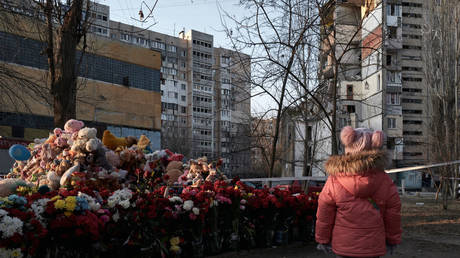 Displaced Ukrainian kids want to live in Russia – human rights boss
Displaced Ukrainian kids want to live in Russia – human rights boss
Some Western commentators warned that the warrants were unlikely to be enforced and that convictions were even less likely. Yet such reservations did not challenge the overall Western consensus that the ICC move was both correct and, in some way, useful, even if mostly in a “symbolic,” that is, really, political manner.
Russian officials, unsurprisingly, responded very differently. They rejected both the charges as “null and void” and the jurisdiction of the ICC. Russia, like the US, is (after withdrawing in 2016) not a signatory state to the 1998 Rome Statute, on which the court is based. Hence, the decisions of the ICC have “no meaning for Russia,” as Maria Zakharova, the spokesperson of the Ministry of Foreign Affairs put it. Russia even started its own investigation against members of the ICC, and later Graham.
Russian commentators, as well as dissenting voices in the West, also denounced the ICC warrants as an abuse of judicial procedures for political purposes, amounting to a form of information war or lawfare against Russia. The Grayzone’s Jeremy Loffredo and Max Blumenthal, for instance, investigated the ICC’s evidence and found that it was fundamentally flawed. Their work was thorough, and their findings were detailed as well as, for the ICC and Karim Khan personally, deeply embarrassing.
The key point was that Khan had based much of his case on a report produced by the Humanitarian Research Lab (HRL) at Yale University, an organization “funded and guided” by the US State Department’s Bureau of Conflict and Stabilization Operations, an entity the Biden administration established in May 2022 to advance the prosecution of Russian officials.” In addition, the executive director of HRL, Nathaniel Raymond, started contradicting himself. Whereas he had initially made grandiloquent public statements in the Graham-Zakaria register – even including a bizarre reference to “genocide” – he greatly toned down his allegations once challenged by investigative reporters. No wonder, as the HRL report was weakly sourced, and its content actually contradicted Raymond’s inflammatory rhetoric.
In other words, the ICC prosecutor had relied on a tainted source that crudely served the information warfare purposes of Russia’s main geopolitical opponent, to such a degree that even its executive director ultimately got cold feet. That this badly undermined Karim’s case and his reputation as a professional needs no further belaboring. Washington will be Washington, but why should the ICC join it? If, that is, it seeks to be respected.
In legal terms, the cases have already been shown to be shoddy. They are unlikely to succeed, and not only because of practical and political obstacles, but, more importantly, because there is much more politics than evidence behind them. In terms of those politics, ironically, they have also failed: The warrants have not led to or increased the isolation of Russia or its president. If they have weakened anything, then it is the standing of the ICC, and, in particular, of its Prosecutor Karim Khan. The ICC is already struggling with a deserved reputation as a willing tool of Western geopolitics, while turning a blind eye to the West’s crimes. The attempt to engage in geopolitical lawfare on Russia during a Western proxy war against it has made this image problem worse. Whether a coincidence or not, the fact that one of the judges who issued the warrant for the Russian president has just become the ICC’s new president will only deepen this impression of bias.
Read more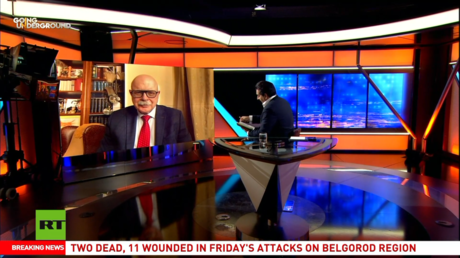 Putin stands for re-election as NATO pushes Russia to the brink of direct conflict (Dmitri Trenin)
Putin stands for re-election as NATO pushes Russia to the brink of direct conflict (Dmitri Trenin)
Yet what has recently cast an especially harsh new light on the ICC’s campaign against Russia is a matter of comparison, namely between the ICC’s treatment of Russia and of Israel. And, to get a popular piece of nonsense out of the way: comparison is not “whataboutism.” Justice, and that is what courts are supposed to be about, cannot exist without consistency. To assess consistency requires comparison. The cry of “whataboutism” is merely the last refuge of the special pleaders, that is, those who want bias and thus injustice as long as it favors their own side.
As early as April 2023, another Grayzone piece of reporting found that Khan was stalling “the ICC’s case against Israel, frustrating human rights lawyers who represent the victims of grisly violence in the besieged Gaza Strip.” As critical lawyers pointed out even then, a court genuinely interested in the unlawful displacement of civilians, should have put decades of Israeli ethnic cleansing of Palestinians at the center of its activity.
In addition, the ICC stopped investigating American war crimes in Afghanistan. The US, in return, started displaying a favorable attitude – and offering generous financial support – to the ICC, which, previously, it had threatened with invasion in case it should ever dare prosecute Americans.
And all of that before Israel’s current genocidal campaign in Gaza, which began after the Hamas attack in early October 2023. Tel Aviv and its Western supporters – in criminal terms, which do apply here, accomplices – have pretended Israel has responded with a “war” on Hamas. But, in reality, everything – explicit Israeli statements, tactics, and, last but not least, the open display of sadism by many of its soldiers and civilians as well – show conclusively that this is not “war,” terrible as the latter is. Instead, this is a genocide executed with the purpose of ethnic cleansing, to be precise, the expulsion of Palestinians from Gaza (at least).
Prompted by South Africa, even the International Court of Justice – in a sense, the ICC’s “sibling” organization – has already recognized that genocide is at least a plausible possibility. It is important to understand that ICJ cases take years to conclude. At this point, a finding of a plausible possibility of genocide is the worst imaginable outcome for Israel already. In view of the fact that Tel Aviv has since then resolutely disregarded all the instructions the ICJ issued to restrain its assault, it is all the more likely that, in the end, Israel will be fully convicted.
Read more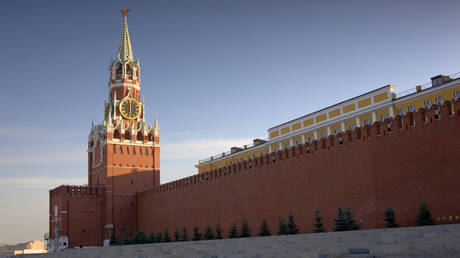 ICC arrest warrant for Russian commanders is invalid – Kremlin
ICC arrest warrant for Russian commanders is invalid – Kremlin
And yet while the ICJ deals with cases between states, the ICC tries individuals – and has been conspicuous by its reticence to charge Israeli citizens. Critics have pointed out that the court and Khan himself have, once again, been very slow in reacting to Israel’s crimes. Mick Wallace, an Irish member of the European Parliament, has denounced Khan as a “pawn of US Empire” who has displayed pro-Israeli bias and cannot “be trusted to deliver justice.” Only Khan’s removal, says Wallace, could save the ICC from irrelevance. The BDS (Boycott Divestment Sanctions) movement, a key player in Palestinian and international resistance to Israel, has even accused Khan of being an accomplice to Tel Aviv’s genocide and, unsurprisingly, also called for him to be fired.
Only recently, as we are now looking back on half a year of unrelenting Israeli atrocities against the Palestinians in Gaza (and, as a matter of fact, elsewhere, too) have Khan and the ICC slowly started stirring themselves. Yet even now their efforts appear disingenuous. For instance, when finally appointing a prosecutor to lead the investigation into Israel’s actions against the Palestinians, Khan managed to find perhaps the worst candidate imaginable. Andrew Cayley is obviously well-embedded in the British establishment. He used to serve as the UK’s chief military prosecutor. He is a committed and open Conservative, while claiming that that does not tarnish his objectivity. Last but not least, according to The Guardian, Cayley “played a key role in a process that resulted in” the ICC giving up on a “long-running investigation into allegations that UK military personnel committed war crimes in Iraq.” Ask yourself: If you were Palestinian, would you expect fair treatment from a man with this CV?
As if to make things even worse for its own reputation, the ICC has recently added arrest warrants against two high-ranking Russian officers. In their case, the essence of the charges is that they are held responsible for attacks on infrastructure in Ukraine that, the court alleges, went beyond what humanitarian law permits. Really? The same court that has never issued similar warrants against US officers, while the comprehensive devastation of infrastructure – on a scale that Russia has not matched in Ukraine – is routine in American warfare? The same court that is dragging its feet over Israel’s assault on Gaza, which is all about mass killing of civilians not “only” directly but by the deliberate and virtually total destruction and crippling of infrastructure?
The ICC is neither promoting nor protecting human rights and international law. In reality, its obvious and indecently manifest political bias is undermining both. Is it possible that, one day, the ICC will change course, abandon its current role as an instrument of Western geopolitics, and finally do its job: pursue justice without bias? Maybe. No one knows the future. But one thing is predictable: If the ICC continues in what we might call the Khan mode of flagrant subservience, then it will become irrelevant, and soon.
-
Site: RT - News
The FTX founder’s sentencing hearing is scheduled for the end of this month
Federal prosecutors have requested prison terms ranging from 40 to 50 years for Sam Bankman-Fried, founder of the cryptocurrency exchange FTX, over mass fraud leading to the company’s collapse.
Lawyers have also asked that the defendant be ordered to pay $11 billion in restitution when he is sentenced on March 28 at the US District Court in Manhattan. The federal probation department separately recommended a 100-year sentence for Bankman-Fried, 32. He faces a maximum possible penalty of 110 years.
In November, Bankman-Fried was found guilty on seven counts of fraud and conspiracy linked to his ill-fated cryptocurrency exchange, the world’s second-largest at the time of its insolvency, and a related hedge fund.
“In every part of his business, and with respect to each crime committed, the defendant demonstrated a brazen disrespect for the rule of law,” prosecutors said in the filing published on Friday. They added that Bankman-Fried’s “historic” crime involved over a million of potential victims and losses of more than $10 billion.
They emphasized that the defendant “understood the rules, but decided they did not apply to him.”
Bankman-Fried was arrested last December on a long list of fraud charges after his once-successful crypto exchange, FTX, abruptly filed for bankruptcy. Prosecutors said he embezzled $8 billion in customers’ money to make investments, buy real estate, and make up for losses at a separate hedge fund, among other things, for which he faced one count of wire fraud, two counts of conspiracy to commit fraud, and one count of money laundering conspiracy.
READ MORE: Disgraced FTX founder convicted of fraud
The government also alleged that Bankman-Fried borrowed large sums of money from FTX on behalf of his hedge fund, Alameda Research, and lied to auditors about the firm’s risk management. The fund’s former chief executive and Bankman-Fried’s ex-girlfriend, Caroline Ellison, has pleaded guilty to separate charges for her role in the scheme, and testified against Bankman-Fried during his trial.
Like this story? Share it with a friend!
-
Site: RT - News
Kiev’s forces will soon be able to target only one in five incoming Russian projectiles, the paper has reported
Ukraine has told its Western backers that munitions for some of its air defense systems could be almost used up by the end of March, the Washington Post has reported, citing US officials.
According to the sources, representatives of Kiev made the warning during a security conference last month, the paper wrote in an article on Friday.
Ukrainian forces, which previously managed to shoot down four out of every five missiles fired by Russia, may soon be able to target only one in five, one of the officials claimed.
The lack of air defense missiles is going to “have a significant effect on life in Ukraine’s urban centers,” the source said.
Russia has been carrying out a large-scale missile and drone campaign against Ukrainian military targets, defense-industrial complex facilities and critical infrastructure since the fall of 2022. Russia Defense Minister Sergey Shoigu said previously that the aim of the attacks was to “crush Ukraine’s military potential.”
Read more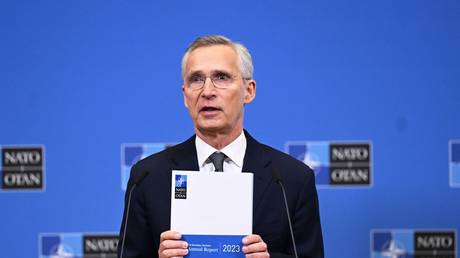 NATO chief warns allies against ‘historic mistake’
NATO chief warns allies against ‘historic mistake’
On Wednesday, the Defense Ministry in Moscow said that a US-supplied Patriot air defense system had been destroyed by Russian forces in Ukraine’s Kharkov Region. Last week, it published a video of a successful strike on a Soviet-era S-300 air defense system deployed by Ukraine in Russia’s People’s Republic of Donetsk.
The US officials who talked to WaPo warned of “catastrophic breakdown of Ukrainian lines in the grimmest contingency and the likelihood of massive casualties in the best” if Kiev does not get more military assistance from Washington.
The administration of US President Joe Biden has been trying to push through another $60 billion in assistance for Ukraine since October last year, but has so far been unable to break the resistance of hardline Republicans, who are demanding increased funding to secure the border with Mexico.
READ MORE: Ukraine’s ammo shortage hurting US strategy – White House
Moscow has repeatedly warned that deliveries of weapons to Kiev by the US, EU and their allies will not prevent it from achieving the goals of its military operation and will only prolong the fighting, and may increase the risk of a direct confrontation between Russia and NATO. According to Russian officials, the provision of arms, intelligence-sharing, and training of Ukrainian troops means that Western nations have already become de-facto parties to the conflict.
-
Site: RT - News
The Latvian foreign minister says the UK should reinstate mandatory military service to deter Russia
Britain and other NATO allies should consider military conscription to counter the supposed threat from Russia, the Latvian foreign minister told The Telegraph in an interview published on Saturday.
Latvia reintroduced compulsory military service earlier this year, in response to the Russia-Ukraine conflict, to increase the size of its “active and ready reserve.” The updated rules oblige all male Latvian citizens aged 18 to 27 to complete one year of service, including those living abroad.
When asked whether the UK and other countries should follow suit, Krisjanis Karins said: “We would strongly recommend this. We are developing and fleshing out a system of what we call a total defense involving all parts of civil society.”
The Latvian diplomat also urged London to raise its defense spending to 3% of gross domestic product, describing the move as “inevitable.”
NATO countries should consider a “total defense” model in which large numbers of citizen-soldiers could be potentially called up at short notice, according to the minister.
Latvia has borrowed elements from the Finnish conscription system, which “could be a very good model for many of us,” Karins said, adding that Finland has a small standing army, “but a very large, very well-trained” war-time reserve “so they can easily call up a 250,000 trained military”.
Read more UK should train ‘citizen army’ to fight Russia – general
UK should train ‘citizen army’ to fight Russia – general
In January, the UK Chief of the General Staff, Patrick Sanders, called for “training and equipping” civilians for a potential call-up in the event of a direct conflict with Russia. However, British Prime Minister Rishi Sunak insisted that there are no plans to introduce conscription.
Britain’s army, navy, and air force had 184,865 active-duty personnel as of late 2023, the lowest figure since the end of the Napoleonic wars. The army has seen its headcount shrink from more than 100,000 in 2010 to 75,983 at the end of last year.
Latvia has been on the frontline of the West’s confrontation with Moscow along with Estonia and Lithuania since the launch of Russia’s military operation in Ukraine. The former Soviet republic, which shares a 284-kilometer border with Russia, joined the EU and NATO in 2004, and abolished conscription in 2006. The Latvian armed forces have served in US-led overseas expeditions, including Kosovo, Afghanistan and Iraq.
Think your friends would be interested? Share this story!
-
Site: RT - News
The US might never have another election if he doesn’t win in November, the former president has said
Former US President Donald Trump has warned of a “bloodbath” for the American automobile industry and the country as a whole if he doesn’t win a second term in the US election on November 5.
Trump made the remark during a rally in Vandalia, Ohio on Saturday while speaking about his plans to protect US carmakers from Chinese competition.
The former president addressed China’s leader Xi Jinping from the stage, saying that “you and I are friends, but… those big monster car manufacturing plants that you’re building in Mexico right now… you’re going to not hire Americans and you’re going to sell the cars to us, no.”
“We’re going to put a 100% tariff on every single car that comes across the line, and you’re not going to be able to sell those cars if I get elected,” the presumptive Republican nominee in the election added.
Trump urged Americans to vote for him in the fall, saying: “Now, if I don’t get elected, it’s going to be a bloodbath for the whole – that’s gonna be the least of it. It’s going to be a bloodbath for the country. That’ll be the least of it.”
Read more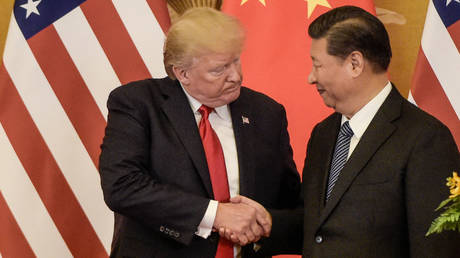 Trump ordered CIA operation against China – report
Trump ordered CIA operation against China – report
Later in his address, he also cautioned the crowd that “if this election isn’t won, I’m not sure that you’ll ever have another election in this country.”
Trump’s speech that evening was mostly improvised as he complained about not being able to use the teleprompter due to strong winds. “I can’t read this damn teleprompter. This sucker is moving. Like reading a moving flag in a 35-mph wind,” the 77-year-old said.
The team of US President Joe Biden interpreted Trump’s mentioning of a “bloodbath” as a threat of “political violence” from their rival. “He wants another January 6, but the American people are going to give him another electoral defeat this November because they continue to reject his extremism, his affection for violence, and his thirst for revenge,” Biden’s campaign spokesman James Singer said in a statement.
Trump campaign spokeswoman Karoline Leavitt responded to the accusations later on Saturday, telling CNN that “crooked Joe Biden and his campaign are engaging in deceptively out-of-context editing.”
READ MORE: ‘A vote for Trump is a vote for Putin’ – Hillary Clinton
Leavitt clarified that the former president was speaking exclusively about the country’s car manufacturing industry. “Biden’s policies will create an economic bloodbath for the auto industry and autoworkers,” she said.
-
Site: RT - News
The ancient tradition of a truce during the games was originally implemented to ensure safe travel for pilgrims and athletes
French President Emmanuel Macron has said he will propose a ceasefire between Russia and Ukraine during the Summer Olympic Games, set to take place in Paris between July 26 and August 11.
In an interview with Ukrainian media on Saturday, Macron was asked whether France, as the host of the games this year, will follow tradition and seek “a ceasefire during the Olympics.” The journalist was apparently referring to the Olympic Truce, a period of conflict cessation which historically began seven days before the games and ended seven days after so that the athletes could safely travel to and from the Olympics.
“It will be requested,” the French leader responded.
“The rule of the host country is to move in step with the Olympic movement,” the French leader said when asked about his views on the situation in which Russian athletes are allowed to participate under a neutral flag.
”This is a message of peace. We will also follow the decision of the Olympic Committee,” he added.
The International Olympic Committee (IOC) originally banned Russian and Belarusian athletes from competing internationally, following the escalation of the military conflict in Ukraine in February 2022. Last year, however, the blanket ban was reconsidered by the organization, and conditions were set to allow individuals, but not the teams, to participate provided that they do so under a neutral flag.
The decision prompted an outcry from Kiev, with President Vladimir Zelensky calling for a complete boycott of the games. However, Ukraine later softened its stance and permitted its athletes to compete as long as the Russians and Belarusians were only present as neutral athletes.
READ MORE: Ukraine to compete at 2024 Olympics on one condition
While Moscow condemned the IOC’s requirements, calling them “unreasonable, legally void and excessive”, the head of the Russian Olympic Committee, Stanislav Pozdnyakov, confirmed on Thursday that this year’s Olympics in Paris would not be shunned, despite the restriction.
“We will never take the path of boycotting (the Games). We will always support our athletes,” he told RIA Novosti.
-
Site: RT - News
SpaceX reportedly signed a $1.8 billion contract with US intelligence services back in 2021
Elon Musk’s secretive Starshield project will allow the US military to track targets and support American and allied ground forces in real time almost anywhere on Earth, Reuters has reported, sharing new details of the billionaire’s dealings with the Pentagon.
SpaceX has been launching prototype military satellites alongside “civilian” payloads on Falcon 9 rockets since at least 2020, before eventually securing a lucrative $1.8 billion contract with the National Reconnaissance Office (NRO) in 2021, Reuters wrote on Saturday, citing five unnamed sources familiar with the project.
The vast constellation of low-Earth orbit satellites will be able to track targets on the ground in real time nearly anywhere worldwide, the sources claimed. One of them boasted that Starshield would ensure “no one can hide” from the US government. The system also reportedly aims to be “more resilient to attacks” by rival space powers.
It remains unclear how many Starshield satellites are currently operational and when the system is expected to fully come online, with SpaceX and the Pentagon ignoring Reuters’ requests for comment. The NRO claimed it is developing “the most capable, diverse, and resilient space-based intelligence, surveillance, and reconnaissance system the world has ever seen,” but refused to comment on SpaceX’s role in the project.
Read more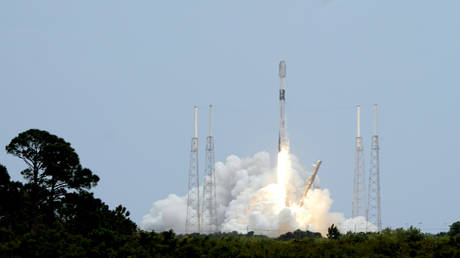 Pentagon discloses military deal with Elon Musk
Pentagon discloses military deal with Elon Musk
The SpaceX CEO previously acknowledged the development of the military alternative to the “civilian” Starlink system, saying in September that it would be “owned by the US government” and controlled by the Department of Defense.
“Starlink needs to be a civilian network, not a participant to combat,” Musk said, referring to the use of the satellites in Ukraine throughout the conflict with Russia.
Musk donated around 20,000 Starlink terminals to Ukraine shortly after Russia launched its military operation in February 2022. Since then, Kiev’s troops heavily relied on the system to maintain communications and operate combat drones along the front line.
Read more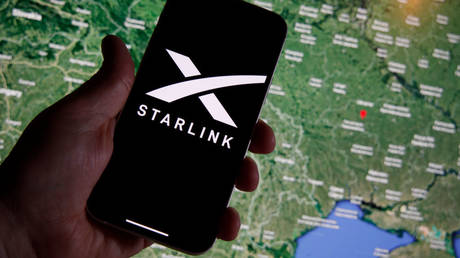 Musk denies providing Starlink to Russia
Musk denies providing Starlink to Russia
While pledging support for Ukraine, Musk has repeatedly said he favors a peaceful resolution of the conflict. The billionaire has come under fire from US officials after refusing Kiev’s demands to use the Starlink network to aid strikes on Russia’s Black Sea Fleet. In turn, Musk argued that activating Starlink in Crimea would be in breach of US sanctions. In the absence of any direct orders from the US leadership, SpaceX opted not to contravene regulations despite Kiev’s request to do so, the tycoon explained.
Earlier this month, US lawmakers reportedly launched another probe into SpaceX, after Ukrainian claims that Russian troops had allegedly used Starlink satellite service on the conflict frontline. Musk has denied the allegations, insisting that “no Starlinks have been sold directly or indirectly to Russia.” The Kremlin has also insisted that the Russian military has never ordered Starlink terminals.
-
Site: RT - News
Going into a war with Russia risks triggering a global conflict, the Italian foreign minister warns
Deploying troops of the US-led NATO bloc to battlefields in Ukraine might result in an all-out global conflict, effectively a Third World War, Italian Foreign Minister Antonio Tajani has said. He has ruled out any possibility that his country’s forces will somehow end up deployed to support Kiev’s fight.
The minister made the remarks on Friday during an interview on the sidelines of the LetExpo show in Verona. Asked about the prospect of NATO troops ending up in such a deployment, Tajani spoke out against the idea.
“I think that NATO shouldn’t enter Ukraine. It would be a mistake. We need to help Ukraine defend itself, but entering the country to wage war against Russia means risking World War Three,” the diplomat stated.
Tajani ruled out any possibility of Italy’s own troops ending up in Ukraine. Asked about other NATO nations sending their troops to prop up Kiev in its fight against Moscow, particularly France, the minister said he hoped “it doesn’t happen.”
Read more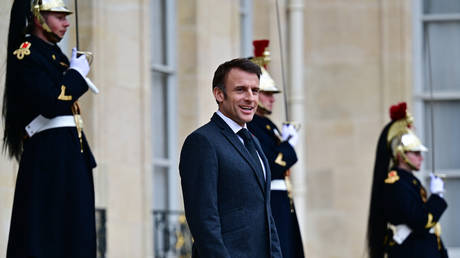 Macron wants Crimea seized from Russia
Macron wants Crimea seized from Russia
The statements from Tajani come after French President Emmanuel Macron again brought up the topic of sending Western soldiers to Ukraine, in a fresh interview with broadcasters TF2 and France 2.
Macron bluntly described Russia as France’s “adversary,” insisting, at the same time, that Paris has not been “waging war on Russia” but merely “supporting” Kiev in the conflict. Regarding the potential troop deployment, he refused to say anything concrete, insisting he wanted to maintain a “strategic ambiguity” and that he had his own “reasons not to be precise.”
The prospect of sending Western troops into Ukraine was first mulled by the French president in late February, when he said the idea could not be “excluded” entirely. The remarks prompted a wave of denials from fellow members of the US-led bloc, with its major participants repeatedly rejecting the idea. Minor states of the alliance, however, including new member Finland, backed Macron’s take on the issue.
-
Site: RT - News
The act, like most of the bloc’s virtue signaling, is the opposite of what its name ought to herald
The EU’s new Media Freedom Act has now been voted into law, with 464 votes for, 92 against, and 65 abstentions.
There are some news outlets whose coverage of the vote I’d like to see. Like RT’s, where you’re reading this right now. But anyone who’s viewing this from inside the European Union’s bastion of democracy and freedom is likely doing so via a VPN connection routed through somewhere outside the bloc, to circumvent its press censorship.
Nothing in this new law suggests that this will change, or that there will be increased access to information and analysis for the average person. Such improved freedoms might lead to people making up their own minds rather than having various flavors of a similar narrative served up for mass consumption. As has become par for the course in so-called Western democracies, inconvenient facts and analysis will still be dismissed as “disinformation” and criticism of the establishment still qualified as an effort to sow division – as though dissent itself wasn’t supposed to be proof of a healthy and vibrant democracy.
So, now that we’ve gotten out of the way any hope of lifting the EU’s top-down censorship in the absence of due process, exactly what kind of lip service does this new law pay to the lofty notion of media freedom?
Read more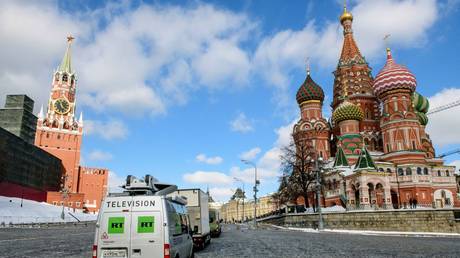 Ukraine to spend millions of dollars blocking Russian TV
Ukraine to spend millions of dollars blocking Russian TV
No spying on journalists or pressing them to disclose their sources. Well, unless you’re one of the countries that lobbied to be able to keep doing this – like France, Italy, Malta, Greece, Cyprus, Sweden, and Finland – so basically, a quarter of EU countries. Oh, but they have to invoke national-security concerns in order to do so. Which, as we know, they’re very discerning about. Like, they didn’t at all implement a virtual police state and extend its powers under the guise of fighting a virus with which French President Emmanuel Macron kept saying they were “at war.” Nor did Amnesty International point out the sweeping “Orwellian” trend across Europe, at least as far back as 2017, of exploiting domestic terrorist attacks to permanently embed what were supposed to be extraordinary powers into criminal law, via measures like “overly broad definitions of terrorism.” So, no doubt they’ll be equally reasonable when slapping the “national security threat” label on a journalist whose work they want to peek at.
At least now, under this new law, they do have to fully inform any targeted journalist of the steps being taken against them.
Another thing that changes is that there’s to be a centralized database into which “all news and current affairs outlets regardless of their size will have to publish information about their owners,” according to an EU press release. May we propose a first candidate for that? The NGO Reporters Without Borders has praised this new law as a “major step forward for the right to information within the European Union.” The same NGO also just launched a “Svoboda” (Russian for “freedom”) satellite package eventually consisting “of up to 25 independent Russian language radio and television channels” aimed at Russia, Ukraine, and the Baltics. The launch took place at the EU parliament, in the presence of EU “values and transparency” commissioner (yes, that’s a real title), Vera Jourova, who has said in support of the new media law that “it is a threat to those who want to use the power of the state, also the financial one, to make the media dependent on them.” But she has also said about this new Russia-targeting initiative that the EU state needs to “use all possible means to ensure that their work, that facts and information can reach Russian-speaking people.” This is the same person who advocated in favor of banning Russia-linked media outlets in the EU.
Read more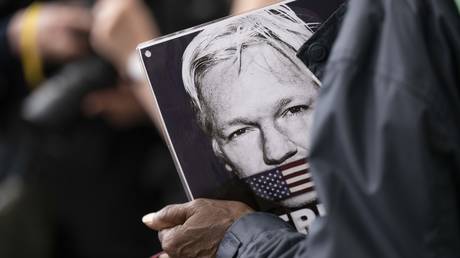 There are chilling parallels between the suffering of Julian Assange and Gaza civilians
There are chilling parallels between the suffering of Julian Assange and Gaza civilians
Anyway, you first, guys. Show everyone else how it’s done. Also, does this mean that all financial interests in the form of advertising spending will also have to be declared by corporate media? Because state-backed media platforms are already transparent; it’s the much more discretionary interests underpinning the more commercial platforms that tend to be much less obvious to audiences. Audiences may not know or understand, for example, why a particular corporate media outlet might focus on a particular nation state with softball interviews, travel pieces, and fluffy documentaries, and treating it with kid gloves in news coverage, when in reality the same country is pumping a ton of ad revenues into the place.
In any case, Queen Ursula von der Leyen’s battalion of bureaucratic desk jockeys is set to grow in ranks now with a new “European Board for Media Services” coming online as a result of the new law. Because freedom isn’t going to police itself, pal.
The name itself Media Freedom Act really is the first clue that it’s probably not all that much about freedom. Kind of like how the “European Peace Facility” fund is used to buy weapons, or the “election” of the handpicked EU Commissioner is really just what any normal country would call a confirmation vote.
It’s a pretty safe bet that whenever the EU kicks the virtue-signaling into overdrive, using feel-good language to sell it, the reality is probably the opposite of what’s advertised.
-
Site: RT - News
A long list of grievances presented by the US ambassador has attracted a frosty reception in Budapest
A keynote speech by the US ambassador to Hungary, David Pressman, sounded more like a “leftist activist” talk than a statement “worthy of an ambassador,” State Secretary at Budapest’s foreign ministry Tamas Menczer has said.
Pressman delivered the controversial speech on Thursday at the Central European University (CEU) in the capital at an event to mark the 25th anniversary of Hungary’s accession to the US-led NATO bloc.
The envoy gave a long list of grievances plaguing ties between Washington and Budapest, ranging from Hungary’s stance on the Russia-Ukraine conflict to its refusal to allow US troops stationed in the country to get local license plates for their family vehicles.
Budapest is now finding itself “increasingly isolated” from the NATO “community of democracies,” the ambassador claimed, insisting that links between the two countries should not depend on their “temporary” leaders.
“We should be mutually concerned for the well-being of democratic values, institutions, and of our relationship – regardless of who has the privilege of temporarily leading either of our governments,” the envoy stated.
Pressman also took personal jabs at Prime Minister Viktor Orban, criticizing him for viewing the US as Hungary’s “adversary,” as well as accusing the country’s government of interfering “in a very blatant way” in the internal affairs of others, “all while decrying foreign interference here at home.”
Read more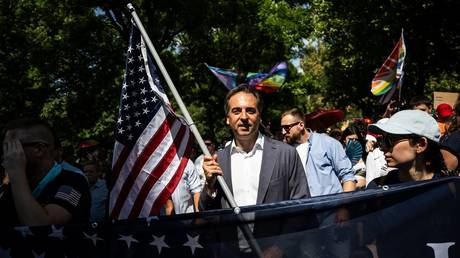 US issues veiled threat to Hungary
US issues veiled threat to Hungary
“PM Orban, who on the one hand baselessly claims the US government is trying to overthrow his government, publicly calls for the political defeat of the President of the United States and actively participates in US partisan political events,” Pressman stated.
The envoy also appeared to issue a thinly-veiled threat aimed at the Orban government, stating that while it “may want to wait out the United States government, the United States will certainly not wait out the Orban administration.”
“While Hungary waits, we will act,” Pressman warned.
The speech was poorly received in Budapest, with Foreign Ministry State Secretary Menczer taking to Facebook to criticize the American envoy, suggesting his hostile remarks were not appropriate for his role at all, as international relations should actually be based on “mutual respect.”
“Hungary has always had great respect for the United States, and it always will. However, today’s speech was not a speech worthy of an ambassador, but rather a speech by a leftist political activist,” Menczer wrote.
Pressman has been US ambassador to Hungary since late 2022, repeatedly finding himself at odds with the local government and making harsh statements about its policies. In January, for instance, he accused Budapest of harming the entire NATO bloc while helping Moscow with its actions.
-
Site: RT - News
EU leadership should “start trembling,” the Hungarian PM told a crowd at an event commemorating national revolution
Hungary’s Prime Minister Viktor Orban has said that he and his supporters are ready to march on Brussels to defend their country’s sovereignty within the EU.
Orban gave the warning on Friday in a fiery speech dedicated to an anniversary of Hungary’s unsuccessful revolution of 1848 against the rule of the Austrian Empire. “Brussels is not the first empire that has set its eyes on Hungary,” he stressed.
The conservative prime minister told a crowd of around a thousand of his supporters that he’s ready to do everything to protect Hungary from what he described as attempts by the EU to “force” the country into the conflict between Russia and Ukraine, to make it accept migrants, and to “re-educate” its children by imposing an LGBTQ agenda on them.
Powers in the Western world, of which the EU is a part, “start wars, destroy worlds, redraw countries’ borders and graze on everything like locusts,” Orban told his audience. “We Hungarians live differently and want to live differently,” he pointed out.
“If we want to defend Hungary’s freedom and sovereignty, we have no other choice but to occupy Brussels,” the PM said. “We will march all the way to Brussels, and will orchestrate change in the EU ourselves.”
Read more US issues veiled threat to Hungary
US issues veiled threat to Hungary
Orban stressed that he and his supporters are experienced people who know what needs to be done in order to properly restructure the bloc, of which Hungary has been a member since 2004. It’s time for the EU leadership to “start trembling,” he said.
In power for 14 years now, Orban is being criticized by Brussels over allegedly undermining the rule of law, infringing on press freedoms and clamping down on gay rights. The EU has been withholding funds from Hungary for years over these and other issues.
Brussels is also unhappy about the stance taken by Budapest on the conflict between Russia and Ukraine, a neighbor to which it has refused to provide arms, unlike other fellow EU member states, while at the same time maintaining economic and political ties with Moscow. Orban insists that there’s no military solution to the crisis and that it should be settled through diplomacy.
READ MORE: EU state blasts Biden’s ‘dictatorship’ remarks
During his speech, he reiterated that “Hungary can only benefit from peace, we do not want war.” However, Brussels has brought the conflict to its doors, he said, referring to the ongoing fighting. “We have been deceived, it is time to rise up,” he stated.
-
Site: RT - News
The German chancellor has clarified that profits obtained from Moscow’s funds held in the EU will be used to arm Kiev
German Chancellor Olaf Scholz has said that interest accrued from Russian assets frozen in the EU will be used to purchase weapons for Ukraine.
Soon after Russia launched its military operation against Ukraine in February 2022, Western countries froze approximately $300 billion of funds belonging to the Russian Central Bank. Of that sum, the Brussels-based clearinghouse Euroclear holds around €191 billion ($205 billion), which has accrued nearly €4.4 billion in interest over the past year.
Speaking at a joint press conference with French President Emmanuel Macron and Polish Prime Minister Donald Tusk in Berlin on Friday, Chancellor Scholz said: “We will use windfall profits from Russian assets frozen in Europe to financially support the purchase of weapons for Ukraine.”
The German leader also announced plans to establish a “new capability coalition for long-range rocket artillery,” with procurement to take place “on the overall world market.”
Read more Seizing Russian money could ‘devastate’ Euroclear – Reuters
Seizing Russian money could ‘devastate’ Euroclear – Reuters
The German chancellor did not provide specifics, and it remains unclear whether he was referring to an entirely new initiative, or to a “long-range” scheme announced by President Macron in February.
European Commission President Ursula von der Leyen last month suggested using the interest from frozen Russian assets to buy weapons for Ukraine. However, Politico, citing an anonymous EU official, reported on Thursday that Malta, Luxembourg and Hungary had “expressed reservations” about the plan earlier this week.
Moscow has repeatedly warned that any actions taken against its assets would amount to “theft.” It has stressed that seizing the funds or any similar move would violate international law and undermine Western currencies, the global financial system, and the world economy.
-
Site: RT - News
Lithuanian President Gitanas Nauseda will meet with Arvydas Anusauskas on Saturday
Lithuanian Defense Minister Arvydas Anusauskas has handed in his resignation to Prime Minister Ingrida Simonyte, the government’s press office said in a statement on Friday. Anusauskas was also scheduled to meet with President Gitanas Nauseda on Saturday, according to the agenda of the head of state.
Journalist Edmundas Jakilaitis launched a wave of speculation on Friday evening, when he wrote on Facebook: “Thanks to Arvydas Anusauskas. We'll see how Laurynas Kasciunas will do.”
Anusauskas jokingly directed all questions to Jakilaicius after the post.
“I promised him to refer all interested parties to him for that message, so go ahead, call, ask,” he said.
Read more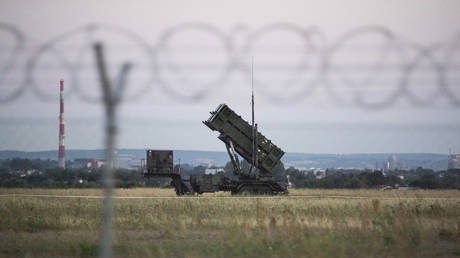 NATO bringing missiles closer to Russia – member state
NATO bringing missiles closer to Russia – member state
Earlier this week, the Lithuanian media predicted that MP Laurynas Kasciunas could succeed Anusauskas as defense chief.
The Lithuanian daily “15 min” reported that the defense minister had requested a meeting urgently, which could signal disagreements between him and Prime Minister Ingrida Simonyte. The latter allegedly disapproved of statements he had made in the United States, which he visited this week.
Lithuania’s upcoming parliamentary elections, scheduled for October, could also be a source of political tension. According to the polls, Anusauskas is the most popular member of the conservative Homeland Union – Lithuanian Christian Democrats party.
According to Lithuanian law, a cabinet minister must submit a resignation statement to the prime minister, and the prime minister must hand it over to the president.
A NATO member state since 2004, Lithuania has been actively supporting Ukraine since the start of its conflict with Russia. The Baltic country has also been beefing up its own defenses over the past two years.
In a post on X (formerly Twitter) last month, Lithuania’s ambassador to Sweden Linas Linkevicius warned that Russia’s western exclave of Kaliningrad would be “neutralized first” if Moscow “dares to challenge NATO.”
Russia has consistently made it clear that it considers NATO’s military buildup close to its Western borders to be a threat to its national security.
Russian President Vladimir Putin has also said that Moscow has no plans to attack NATO, stressing that his country “has no interest… geopolitically, economically or militarily” in doing so.
-
Site: RT - News
Sanctions against Moscow should be implemented in full, Alexander Schallenberg has said
The majority of Western companies continue to operate in Russia despite many foreign businesses announcing their exit from the country in response to the conflict between Moscow and Kiev, Austria’s Foreign Minister Alexander Schallenberg has said.
Austrian firms are “heavily engaged” in both Russia and Ukraine, Schallenberg acknowledged during a joint press-conference with US Secretary of State Antony Blinken in Vienna on Friday. Austria is the sixth largest investor in the Ukrainian economy, he stressed.
“And yes, Austrian companies were also present in Russia and are partly still present, as about 95% of all Western companies,” the foreign minister claimed. Schallenberg insisted that international restrictions placed on Moscow over its military operation against Ukraine must “be respected fully… There cannot be any exceptions.”
He also accused Russian President Vladimir Putin of using gas and grain as “leverage” amid the standoff with the West. Austria will continue to reduce its reliance on gas supplied by Russia, with the goal of becoming “100% independent” by 2027, the minister vowed.
Read more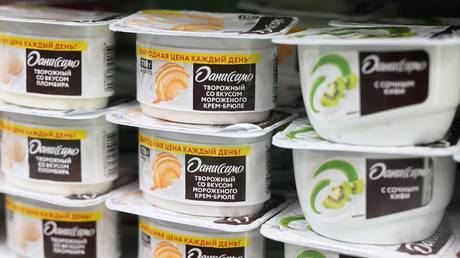 Putin calls off nationalization of Danone Russia
Putin calls off nationalization of Danone Russia
It’s important for Vienna and Washington to “stand together side by side” in view of the conflict between Russia and Ukraine, Schallenberg said.
Last week, Politico reported that Washington has been pressuring one of Austria’s largest banks, Raiffeisen Bank International, to withdraw from Russia. According to the outlet, the US Treasury's Acting Assistant Secretary Anna Morris told Austrian officials and the company’s representatives that the bank risks being shut out of the US financial system if it fails to comply with the demand.
Raiffeisen said that it has reduced its operations in Russia significantly since February 2022, but it remains reluctant to withdraw from the country, as it generated almost half of its profits there last year.
The Financial Times claimed in October that the Russian authorities have banned foreign companies from withdrawing their profits from the country in response to Western sanctions. Kremlin Press Secretary Dmitry Peskov didn’t confirm the report directly at the time, but said that considering the “quasi-war” being waged by the US and EU against Russia, “a special regime” was in place for Western companies “that leave the country under pressure from their governments.”
Apple, IKEA, Microsoft, IBM, Shell, McDonald's, Volkswagen, Porsche, Toyota and H&M were among the first to quit Russia after the outbreak of the fighting between Moscow and Kiev in 2022, but many foreign businesses opted to stay, with some of them switching to Russian ownership or re-branding.
READ MORE: LG, Sony, Bosch leaving Russia – media
In February, Russia’s Deputy Prime Minister Denis Manturov said about 20% of major European and US companies have left the Russian market, but the rest have kept their businesses in Russia and some are increasing their investments.
-
Site: RT - News
Berlin has so far refused to provide Kiev with Taurus cruise missiles
European countries intend to create yet another “capability coalition” to supply Ukrainian forces with long-range weapons, German Chancellor Olaf Scholz said on Friday, echoing an initiative floated by French President Emmanuel Macron.
During a joint press conference with Macron and Polish Prime Minister Donald Tusk in Berlin on Friday, the German chancellor stated that the countries have agreed to expand their own production of military equipment and “procure even more weapons for Ukraine, on the overall world market.”
“We are establishing a new capability coalition for long-range rocket artillery,” Scholz told journalists. The German leader provided no specifics and took no questions, so it remains unclear whether he meant something new, or was referring to a “long-range” initiative announced by Macron last month.
Read more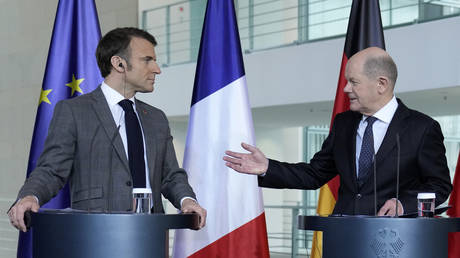 ‘We’re not at war with Russia,’ Scholz tells Macron
‘We’re not at war with Russia,’ Scholz tells Macron
Following a summit of Ukraine’s backers in Paris, Macron said that France would lead a new coalition that aims to provide Kiev with “medium and long-range missiles and bombs.” Much like many previous Western “capability coalitions” focused on drones, artillery, air defenses and others, the new group seeks to unite those who want to boost Ukraine’s specific ability to “carry out deep strikes,” the French leader said at the time.
It remains unclear what new types of weapons Kiev’s foreign sponsors could supply, as the UK and France have already been providing their Storm Shadow and SCALP-EG long-range cruise missiles since last year, with Macron pledging another 40 missiles in January. The US also sent some of its ATACMS missiles, but Kiev has already depleted the limited supply, and has repeatedly called for additional weapons amid the suspension of American aid.
Read more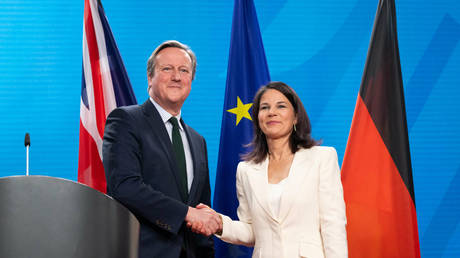 UK pressures Germany on long-range missiles for Ukraine
UK pressures Germany on long-range missiles for Ukraine
Scholz has so far refused to send German-made Taurus missiles to Ukraine in order to avoid the risk of a direct conflict with Russia, resisting pressure from foreign partners and some politicians at home.
On Wednesday, Scholz again insisted that the delivery of Taurus missiles was “a line that I don’t want to cross as chancellor.” He explained that such a shipment would inevitably require the presence of German military personnel on Ukrainian soil – a development that is “out of the question.”
-
Site: RT - News
Finland’s foreign minister has argued that nobody knows how “serious” the conflict could become
Finland agrees with France that all options must remain on the table to support Kiev's war effort against Moscow – but at this stage Helsinki is not willing to send its own troops to Ukraine or even discuss such a possibility, according to Foreign Minister Elina Valtonen.
French President Emmanuel Macron provoked a backlash in February when he suggested that the US-led military bloc “cannot exclude” the possibility of sending NATO soldiers to help Ukraine. Several member states, including Finland’s then-president, quickly repudiated Macron’s remarks – asserting that they would not put boots on the ground in Ukraine.
However, the Finnish foreign minister argued that all options should be considered if the situation deteriorates for Ukraine, Politico’s National Security Daily newsletter reported on Friday.
READ MORE: Western troops in Ukraine: How a big lie could lead to the biggest war
“It’s important that we not rule everything out for the long term, because we never know how serious the situation becomes,” Valtonen said.
But the Finnish position is clear: We are not right now sending any troops and not willing to discuss that.
In the meantime, Western backers “could do so much more” to arm Kiev, Valtonen argued. She criticized Washington for dragging its feet on new aid, saying its reputation was at stake.
Finland, which joined NATO last April, has been spending more than the alliance's target of 2% of GDP on its military – and more than 0.6% of GDP on Ukraine.
Read more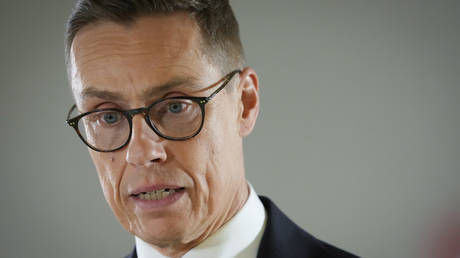 Finland’s new president hails American nuclear weapons
Finland’s new president hails American nuclear weapons
Finland shares a 1,300 kilometer border with Russia, and Moscow has argued that NATO membership has threatened, not guaranteed, Finnish security. After Finland joined the bloc last year, Russian President Vladimir Putin announced the creation of a new military district bordering the Nordic nation. “There was no trouble” before Finland joined the bloc, he said in December, adding: “now there will be.”
Finland’s newly elected president Alexander Stubb promised at his inauguration to lead the Nordic nation into a “new era” of military partnership with the West, boasting that NATO membership gives his country a “real nuclear deterrent” in the form of American missiles.
-
Site: RT - News
By providing military aid to Kiev, the US has strained its own arsenals; the Congressionally approved money pot has run dry
The US Defense Department has asked the nation's Congress to allocate at least $6.5 billion to replenish its stocks, which have been depleted after two years of constant weapon deliveries to Ukraine, according to a document seen by Bloomberg.
The Pentagon alerted Congress that spending on replenishment was a high priority in the proposals it submitted last month, the outlet reported on Thursday.
The shopping list reportedly includes a wide range of weapons, ammunition and critical components for the production of 155mm shells, HARM anti-radar missiles, Patriot interceptors, GMLRS rockets and anti-tank TOWs.
While the Pentagon estimated the price of its immediate replenishment needs at $6.5 billion, multiple US media reports suggested earlier this week that the total deficit could be at least $10 billion. Unless the shortfall is compensated, the “ongoing hole” will put a strain on the US military, one source told Politico.
READ MORE: Ukraine’s ammo shortage hurting US strategy – White House
Washington had provided more than $75 billion in cash and equipment for Ukraine’s war effort by the end of last year, far surpassing other Western donors, but the deliveries stopped after the Congressionally approved money pot ran dry.
Read more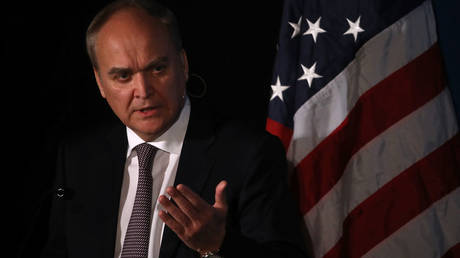 Russia accuses US of ‘direct involvement’ in Ukraine conflict
Russia accuses US of ‘direct involvement’ in Ukraine conflict
The White House has requested over $60 billion in supplemental Ukraine assistance, but the Republican-controlled House has stonewalled repeated calls by US President Joe Biden to release the money. Biden has blamed US lawmakers for Kiev’s recent battlefield losses, including last month’s fall of Avdeevka to Russian forces.
Despite running out of money, the White House has found enough “unanticipated savings” at the Pentagon to announce a new aid package valued at up to $300 million this week. The Pentagon still has the authority to send some $4 billion worth of aid to Ukraine, but Defense Secretary Lloyd Austin has so far been reluctant to tap into that fund, with no assurances the money will be replaced by US lawmakers.
-
Site: RT - News
No ‘lasting peace’ is possible without Ukraine gaining control of the Russian peninsula, the French president has claimed
Ukraine must regain control over all the territories it once held, including Russia’s Crimean Peninsula, French President Emmanuel Macron has said. Otherwise, no “lasting peace” will be possible, he claimed.
The president made the remarks on Thursday in an interview with broadcasters TF2 and France 2, bluntly describing Russia as France’s “adversary.” At the same time, he insisted that Paris has not been “waging war on Russia” but merely “supporting” Kiev in the conflict.
“Certainly, today, Russia is an adversary. The Kremlin regime is an adversary,” Macron stated. “We are doing everything so that it can put Russia in check because, I will tell you very simply, there is no lasting peace if there is no sovereignty, a return to the internationally recognized borders of Ukraine, including Crimea.”
The latest remarks by the French president got a cold reception in Russia, with Kremlin spokesman Dmitry Peskov stating that Macron apparently “won’t mind increasing the degree of his involvement” in Russia-Ukraine hostilities.
“Yes, it’s obvious that Russia is an adversary of France because France is already involved in the war in Ukraine; it is indirectly taking part in this war,” Peskov told reporters.
Read more ‘We’re not at war with Russia,’ Scholz tells Macron
‘We’re not at war with Russia,’ Scholz tells Macron
The French president has produced increasingly belligerent statements lately, standing by the remarks he made late in February, that a potential deployment of NATO troops into Ukraine cannot be “excluded.” The remarks prompted a wave of denial from fellow members of the US-led bloc. In this latest interview, Macron refused to elaborate on the matter, claiming he wanted to maintain “strategic ambiguity” and that he has “reasons not to be precise.”
Macron’s remarks echo the position repeatedly voiced by the top Ukrainian leadership, which proclaimed the goal of seizing from Russia all the territories that ended up being held by Kiev following the collapse of the Soviet Union.
Crimea broke away from Ukraine in the aftermath of the 2014 Maidan coup in Kiev, promptly rejoining Russia after a peninsula-wide referendum. The Donetsk and Lugansk People’s Republics emerged this year as well, with the botched attempt of Kiev’s new authorities to suppress them by force resulting in years-long conflict in then-Ukrainian Donbass.
The two republics, as well as the formerly Ukrainian Zaporozhye and Kherson regions, were incorporated into Russia in late 2022 after the idea was overwhelmingly backed by locals in referendums separately held in each territory. Moscow has repeatedly signaled that its sovereignty over Crimea and any other Russian territories is not a subject to negotiation with anyone.
-
Site: RT - News
The social media influencing campaign was intended to foster ‘paranoia’ among top leaders in Beijing, Reuters reported
Former US President Donald Trump authorized a secret CIA influence campaign aimed at smearing the Chinese government and turning public opinion against its leaders, Reuters reported on Thursday, citing ex-officials with knowledge of the operation.
According to the report, the CIA formed a team of operatives in 2019 who used fake internet identities to spread “negative narratives” about President Xi Jinping’s government and leak “disparaging intelligence” to foreign news outlets.
Among the narratives spread by the CIA on Chinese social media platforms were allegations that members of the ruling Communist Party were hiding money overseas. The Belt and Road Initiative, China’s global infrastructure development strategy, was also framed as “corrupt and wasteful.”
The US officials who spoke to Reuters said the effort by the Trump administration was intended to “foment paranoia among top leaders” and force the government in Beijing to expend resources chasing up intrusions into its internet space.
“We wanted them chasing ghosts,” one former official said. The sources described the operation as an American response to “years of aggressive covert efforts by China aimed at increasing its global influence.”
Read more Trump comments on why he didn’t ban TikTok
Trump comments on why he didn’t ban TikTok
A CIA spokesperson contacted by Reuters declined to comment on the existence of the program.
A spokesperson for China’s Ministry of Foreign Affairs told the outlet that the revelation proved that Washington uses public platforms “as weapons to spread false information and manipulate international public opinion.”
During his time in office, Trump orchestrated a shift in US foreign policy from the Middle East to China, with the Pentagon branding China as Washington’s top “strategic competitor” in its 2018 National Defense Strategy. Trump also waged a large-scale trade war against Beijing for much of his term.
In 2020, the president also tried to block access to the Chinese-owned TikTok platform through an executive order, arguing that it was a threat to national security.
Amid recently renewed efforts by Congress to ban the app, Trump, now the 2024 the Republican presidential frontrunner, told CNBC this week that he chose to back away from efforts to ban the platform due to its popularity among young Americans and concerns that it would strengthen rival social media giant Facebook, which he described as “an enemy of the people.”
READ MORE: Ex-US Treasury Secretary reveals TikTok purchase plans
On Wednesday, the House of Representatives voted to force the platform’s Chinese owner ByteDance to sell the app within six months or face a US ban – and on Friday, former US Treasury Secretary Steven Mnuchin said he was building an investor group to buy TikTok.
Reuters said it was unable to determine what impact the secret CIA operation had in China or whether President Joe Biden’s administration has maintained it.
-
Site: RT - News
The incident occurred off the Russian exclave of Kaliningrad, with media reports blaming the interference on Moscow
The UK Ministry of Defence has publicly expressed concerns after a RAF plane with Defence Secretary Grant Shapps was subjected to GPS jamming while flying near the Russian exclave of Kaliningrad. While London did not explicitly assign blame for the incident, British media reports are claiming Moscow was behind it.
The incident was publicized by the ministry on Thursday, with a spokesperson revealing the electronic interference had occurred while Shapps was traveling back to the UK from Poland on Wednesday.
“The plane carrying the defence secretary and his delegation temporarily experienced GPS jamming when they flew close to Kaliningrad,” the spokesperson said.
“It didn’t threaten the safety of the aircraft and it is not unusual for aircraft to experience GPS jamming near Kaliningrad, which is, of course, Russian territory,” the official added.
While the ministry did not overtly attach any blame for the incident on Russia, government sources told the British media that this was likely the case. No actual evidence to back up such allegations, however, has been presented.
Read more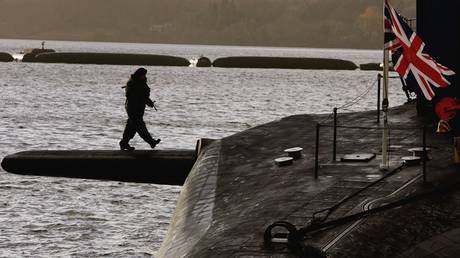 British nuclear submarine test fails
British nuclear submarine test fails
“While the RAF are well prepared to deal with this, it still puts an unnecessary risk on civilian aircraft and could potentially endanger people’s lives. There is no excuse for this, and it’s wildly irresponsible on Russia’s part,” an unnamed defense source told The Times.
Over the past few weeks, GPS connectivity issues have been repeatedly been reported in the vicinity of Kaliningrad, including in Poland as well as in the wider Baltic region, with the issue reaching southern Swedish and northeastern German regions.
While multiple media reports attributed the interference to Russian electronic warfare jammers allegedly getting activated in Kaliningrad, the troubles also correspond with the ongoing military maneuvers of the US-led NATO bloc in the area, said to be the largest exercise staged since the end of the Cold War era. Neither of the suspected parties who might have been causing the GPS interference has provided any public comment on the matter.
-
Site: RT - News
Macron’s latest sallies and the spat they’ve caused show that Western Europe must finally be honest about the causes of the Ukraine conflict
The current situation in the conflict between Ukraine – serving (while being demolished) as a proxy for the West – and Russia, can be sketched in three broad strokes.
First, Russia now clearly has the upper hand on the battlefield and could potentially accelerate its recent advances to achieve an overall military victory soon. The West is being compelled to recognize this fact: as Foreign Affairs put it, in an article titled “Time is Running Out in Ukraine,” Kiev and its Western supporters “are at a critical decision point and face a fundamental question: How can further Russian advances… be stopped, and then reversed?” Just disregard the bit of wishful thinking thrown in at the end to sweeten the bitter pill of reality. The key point is the acknowledgment that it is crunch time for the West and Ukraine – in a bad way.
Second, notwithstanding the above, Ukraine is not yet ready to ask for negotiations to end the war on terms acceptable to Russia, which would be less than easy for Kiev. (Russian President Vladimir Putin, meanwhile, reiterated in an important recent interview that Moscow remains principally open to talks, not on the basis of “wishful thinking” but, instead, proceeding from the realities “on the ground.”)
The Kiev regime’s inflexibility is little wonder. Since he jettisoned a virtually complete – and favorable – peace deal in the spring of 2022, President Vladimir Zelensky has gambled everything on an always improbable victory. For him personally, as well as his core team (at least), there is no way to survive – politically or physically – the catastrophic defeat they have brought on their country by leasing it out as a pawn to the Washington neocon strategy.
The Pope, despite the phony brouhaha he triggered in Kiev and the West, was right: a responsible Ukrainian leadership ought to negotiate. But that’s not the leadership Ukraine has. Not yet at least.
Third, the West’s strategy is getting harder to decipher because, in essence, the West cannot figure out how to adjust to the failure of its initial plans for this war. Russia has not been isolated; its military has become stronger, not weaker – and the same is true of its economy, including its arms industry.
Read more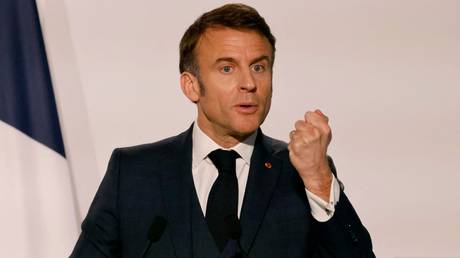 Kremlin responds to Macron’s claim Russia an ‘adversary’
Kremlin responds to Macron’s claim Russia an ‘adversary’
And last but not least, the Russian political system’s popular legitimacy and effective control has neither collapsed nor even frayed. As, again, even Foreign Affairs admits, “Putin would likely win a fair election in 2024.” That’s more than could be said for, say, Joe Biden, Rishi Sunak, Olaf Scholz, or Emmanuel Macron (as for Zelensky, he has simply canceled the election).
In other words, the West is facing not only Ukraine’s probable defeat, but also its own strategic failure. The situation, while not a direct military rout (as in Afghanistan in 2021) amounts to a severe political setback.
In fact, this looming Western failure is a historic debacle in the making. Unlike with Afghanistan, the West will not be able to simply walk away from the mess it has made in Ukraine. This time, the geopolitical blowback will be fierce and the costs very high. Instead of isolating Russia, the West has isolated itself, and by losing, it will show itself weakened.
It is one thing to have to finally, belatedly accepted that the deceptive “unipolar” moment of the 1990s has been over for a long time. It is much worse to gratuitously enter the new multipolar order with a stunning, avoidable self-demotion. Yet that is what the EU/NATO-West has managed to fabricate from its needless over-extension in Ukraine. Hubris there has been galore, the fall now is only a matter of time – and not much time at that.
Regarding EU-Europe in particular, on one thing French President Emmanuel Macron is half right. Russia’s victory “would reduce Europe’s credibility to zero.” Except, of course, a mind of greater Cartesian precision would have detected that Moscow’s victory will merely be the last stage in a longer process.
The deeper causes of EU/NATO-Europe’s loss of global standing are threefold. First, its own wanton decision to seek confrontation instead of a clearly feasible compromise and cooperation with Russia (why exactly is a neutral Ukraine impossible to live with again?) Second, the American strategy of systematically diminishing EU/NATO-Europe with a short-sighted policy of late-imperial client cannibalization which takes the shape of aggressive deindustrialization and a “Europeanization” of the war in Ukraine. And third, the European clients’ grotesque acquiescence to the above.
Read more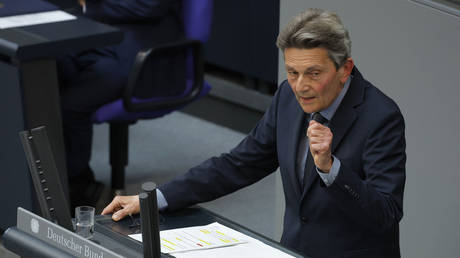 Top German government MP calls for end to Ukraine conflict
Top German government MP calls for end to Ukraine conflict
That is the background to a recent wave of mystifying signals coming out of Western, especially EU/NATO elites: First, we have had a wave of scare propaganda to accompany the biggest NATO maneuvers since the end of the Cold War. Next Macron publicly declared and has kept reiterating that the open – not in covert-but-obvious mode, as now – deployment of Western ground troops in Ukraine is an option. He added a cheap demagogic note by calling on Europeans not to be “cowards,” by which he means that they should be ready to follow, in effect, his orders and fight Russia, clearly including inside and on behalf of Ukraine. Never mind that the latter is a not an official member of either NATO or the EU as well as a highly corrupt and anything but democratic state.
In response, a divergence has surfaced inside EU/NATO Europe: The German government has been most outspoken in contradicting Macron. Not only Chancellor Scholz rushed to distance himself. A clearly outraged Boris Pistorius – Berlin’s hapless minister of defense, recently tripped up by his own generals’ stupendously careless indiscretion over the Taurus missiles – has grumbled that there is no need for “talk about boots on the ground or having more courage or less courage.” Perhaps more surprisingly, Poland, the Czech Republic as well as NATO figurehead Jens Stoltenberg (i.e., the US) have been quick to state that they are, in effect, not ready to support Macron’s initiative. The French public, by the way, is not showing any enthusiasm for a Napoleonic escalation either. A Le Figaro poll shows 68 percent against openly sending ground troops to Ukraine.
On the other side, Macron has found some support. He is not entirely isolated, which helps explain why he has dug in his heels: Zelensky does not count in this respect. His bias is obvious, and his usual delusions notwithstanding he is not calling the shots on the matter. The Baltic states, however, while military micro-dwarfs, are, unfortunately, in a position to exert some influence inside the EU and NATO. And true to form, they have sided with the French president, with Estonia and Lithuania taking the lead.
It remains impossible to be certain what we are looking at. To get the most far-fetched hypothesis out of the way first: is this a coordinated bluff with a twist? A complicated Western attempt at playing good-cop bad-cop against Russia, with Macron launching the threats and others signaling that Moscow could find them less extreme, at a diplomatic price, of course? Hardly. For one thing, that scheme would be so hare-brained, even the current West is unlikely to try. No, the crack opening up in Western unity is real.
Regarding Macron himself, too-clever-by-half, counter-productive cunning is his style. We cannot know what exactly he is trying to do; and he may not know himself. In essence, there are two possibilities. Either the French president now is a hard-core escalationist determined to widen the war into an open clash between Russia and NATO, or he is a high-risk gambler who is engaged in a bluff to achieve three purposes. Frighten Moscow into abstaining from pushing its military advantage in Ukraine (a hopeless idea); score nationalist “grandeur” points domestically in France (which is failing already); and increase his weight inside EU/NATO-Europe by “merely” posturing as, once again, a new “Churchill” – whom Macron himself has made sure to allude to, in all his modesty. (And some of his fans, including Zelensky, a grizzled veteran of Churchill live action role play, have already made that de rigueur if stale comparison.)
While we cannot entirely unriddle the moody sphinx of the Elysée or, for that matter, the murky dealings of EU/NATO-European elites, we can say two things. First, whatever Macron thinks he is doing, it is extremely dangerous. Russia would treat EU/NATO-state troops in Ukraine as targets – and it won’t matter one wit if they turn up labeled “NATO” or under national flags “only.” Russia has also reiterated that it considers its vital interests affected in Ukraine and that if its leadership perceives a vital threat to Russia, nuclear weapons are an option. The warning could not be clearer.
Read more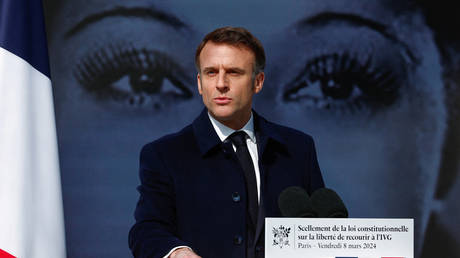 Macron leads the way to Western civilization’s suicide
Macron leads the way to Western civilization’s suicide
Second, here is the core Western problem that is now – due to Russia undeniably winning the war – becoming acute: Western elites are split between “pragmatists” and “extremists.” The pragmatists are as Russophobic and strategically misguided as the extremists, but they do shy away from World War Three. Yet these pragmatists, who seek to resist hard-core escalationists and reign it at least high-risk gamblers, are brought up short against a crippling contradiction in their own position and messaging: As of now, they still share the same delusional narrative with the extremists. Both groupings keep reiterating that Russia plans to attack all of EU/NATO-Europe once it defeats Ukraine and that, therefore, stopping Russia in Ukraine is, literally, vital (or in Macron’s somewhat Sartrean terms “existential”) to the West.
That narrative is absurd. Reality works exactly the other way around: The most certain way to get into a war with Russia is to send troops to Ukraine openly. And what is existential for EU/NATO-Europe is to finally liberate itself from American “leadership.” During the Cold War, a case could be made that (then Western) Europe needed the US. After the Cold War, though, that was no longer the case. In response, Washington has implemented a consistent, multi-administration, bipartisan, if often crude, strategy of avoiding what should have been inevitable: the emancipation of Europe from American dominance.
Both the eastward expansion of NATO, programmed – and predicted – to cause a massive conflict with Russia and the current proxy war in Ukraine, obstinately provoked by Washington over decades, are part of that strategy to – to paraphrase a famous saying about NATO – “keep Europe down.” And the European elites have played along as if there’s no tomorrow, which, for them, there really may not be.
We are at a potential breaking-point, a crisis of that long-term trajectory. If the pragmatists in EU/NATO-Europe really want to contain the extremists, who play with triggering an open war between Russia and NATO that would devastate at least Europe, then they must now come clean and, finally, abandon the common, ideological, and entirely unrealistic narrative about an existential threat from Moscow.
As long as the pragmatists dare not challenge the escalationists on how to principally understand the causes of the current catastrophe, the extremists will always have the advantage of consistency: Their policies are foolish, wastefully unnecessary, and extremely risky. And yet, they follow from what the West has made itself believe. It is high time to break that spell of self-hypnosis, and face facts.
-
Site: RT - News
French leader has promised to incorporate ‘consent’ into new legislation on sexual assault, having opposed its inclusion in EU directive
The President of France Emmanuel Macron has come under fire after saying he was in favor of incorporating the notion that a sexual act without consent should fall under the country’s criminal definition of rape.
The statement came as a surprise for the public, given that Paris had opposed the same idea in a European Union (EU) directive last month.
Macron’s statement was made on March 8, when he met members of the feminist association Choisir la cause des femmes (Choosing Women’s Issues), to mark International Women’s Day.
According to a video seen by AFP this week, the French president told the women’s rights group: “I fully agree that it should be incorporated into French law, that consent should be enshrined,” adding “I’m going to enshrine it in French law.”
The legal definition of rape in France includes the notions of “violence, coercion, threat or surprise,” but makes no mention of “consent.” Women’s rights advocates have been calling for the law to be tightened by including the concept so that any sexual act without consent constitutes rape. Only a tiny fraction of rapes or attempted rapes lead to a conviction, they claim.
Meanwhile, Macron’s comments sparked public backlash since they are in total contradiction to France’s official stance on the issue. France was one of several countries to argue against including a consent-based definition of rape in EU law passed last month. The states in opposition, including Hungary, Germany, Poland, and the Netherlands, argued that rape does not have the cross-border dimension necessary for it to be considered a crime that comes with common penalties across the bloc.
Macron stated in the March 8 video that he did not believe rape was a “Eurocrime,” but that he did want to change French law.
Read more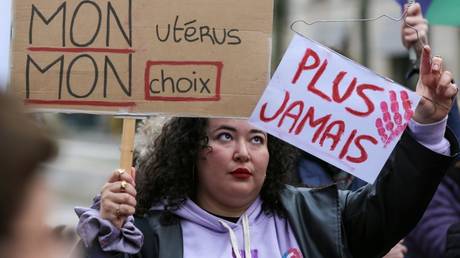 France enshrines abortion in its constitution
France enshrines abortion in its constitution
“We fought for two years to convince France of the importance of adopting this European definition of rape” according to which a sexual act without consent is rape, MEP Nathalie Colin-Oesterle (EPP), her group’s rapporteur on the EU directive, told Euractiv.
“For months, [French Justice Minister] Eric Dupond-Moretti has been explaining to us … that incorporating the notion of consent into the Criminal Code would be absolutely counterproductive and dangerous for women victims, since it would place the burden of proof on them.”
“What an instrumentalization of the cause of women, just a few weeks before the European elections!” Colin-Oesterle concluded.
A group of French lawmakers is currently working on a report on whether to add ‘consent’ to the law that they are to present in mid-April, according to media.
Last year, Spain approved new legislation, dubbed the ‘Only yes means yes’ law, under which all non-consensual sex is seen as rape. Sweden, Denmark, Finland and Greece have all passed similar laws.
-
Site: RT - News
Steven Mnuchin told CNBC he is putting together an investor group to try to buy the short-video app
Former US Treasury Secretary Steven Mnuchin has said he is building an investor group to acquire TikTok, a day after the House of Representatives voted to force the social media platform’s Chinese owner ByteDance to sell the app or face a US ban.
The House passed the legislation by a vote of 352-65 on Wednesday, citing national-security risks. The bill now goes to the Senate. US President Joe Biden previously said he would sign the bill into law if it passes both houses of Congress.
“I think the legislation should pass and I think [TikTok] should be sold,” Mnuchin, who leads Liberty Strategic Capital, told CNBC on Thursday. “It’s a great business and I’m going to put together a group to buy TikTok,” he stated.
Mnuchin, who served as Treasury Secretary under former President Donald Trump, did not specify who the other investors would be in such a deal or the potential valuation for the social media site.
“This should be owned by US businesses,” he stressed, adding “There’s no way that the Chinese would ever let a US company own something like this in China.”
Read more Beijing slams proposed US TikTok ban as ‘bandit logic’
Beijing slams proposed US TikTok ban as ‘bandit logic’
Meanwhile, the Wall Street Journal had earlier reported that former Activision Blizzard CEO Bobby Kotick was also shopping a potential deal to prospective partners. However, according to CNBC, it remains unclear whether the Chinese government would permit ByteDance to sell TikTok to a US buyer.
China has lashed out at an ongoing effort to ban the popular social media platform in the US, with Foreign Ministry spokesman Wang Wenbin saying that such a step would violate international trade rules. TikTok CEO Shou Zi Chew has implied that a sale is not an option.
While TikTok is the only application specifically mentioned in the document currently winding its way through Congress, it creates a framework for Washington to ban other platforms controlled by countries it considers “foreign adversaries,” experts warn. The list of nations labeled as such includes China, Russia, Iran, North Korea and Venezuela.
If inked into law, the bill would give ByteDance 165 days to divest TikTok, which has more than 170 million American users. If it fails to do so, US web-hosting companies would have to remove TikTok and other apps linked to ByteDance from their app stores.
-
Site: RT - News
France seemingly wants to increase its involvement in the Ukraine conflict, spokesman Dmitry Peskov has said
French President Emmanuel Macron is right to call Moscow an “adversary” because Paris is already indirectly involved in the conflict between Russia and Ukraine, Kremlin spokesman Dmitry Peskov has said.
In an interview with the TF1 and France 2 channels on Thursday, Macron insisted that France is “not waging war on Russia” by supporting Kiev, but stated that his government is doing its utmost to ensure a Ukrainian victory. He described Moscow as an “adversary” of France, but declined to brand it an “enemy.”
Responding on Friday, Peskov said Russian authorities have been following the recent rhetoric by the French leader.
“Yes, it’s obvious that Russia is an adversary of France because France is already involved in the war in Ukraine; it is indirectly taking part in this war,” Peskov told reporters.
“But, judging by the [French] president’s statement, he won’t mind increasing the degree of his involvement [in the conflict],” the Kremlin spokesman added.
Read more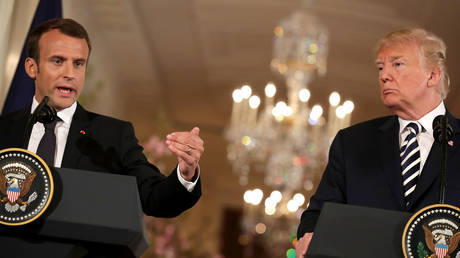 Russia ‘an adversary’ – Macron
Russia ‘an adversary’ – Macron
Macron was asked during his interview with French TV to clarify his recent remarks about the possibility of deploying Western troops to Ukraine. The comments prompted a wave of denials from the leaders of fellow NATO member states, who insisted there are no such plans.
Macron refused to offer any specifics on Thursday, however, claiming he wants to maintain “strategic ambiguity” and that he has “reasons not to be precise.”
He insisted that France will not launch an offensive against Moscow, but added that “if the situation should deteriorate [for Ukraine], we would be ready to make sure that Russia never wins that war.”
Macron also claimed that anyone in the EU calling for “limits” on aid to Ukraine is “choosing defeat,” and that victory for Russia “would reduce Europe’s credibility to zero.”
France has provided Ukraine with €3.8 billion ($4.1 billion) worth of assistance since the conflict with Russia began in February 2022. Deliveries of lethal aid have induced Caesar self-propelled guns, SCALP long-range missiles, and other hardware.
Russian President Vladimir Putin stressed during an interview with national media on Wednesday that Moscow would treat troops from the US or other NATO countries as “interventionists” if they are deployed to Ukraine, and would respond accordingly.
READ MORE: Putin issues warning on US troops in Ukraine
Western servicemen are already present in Ukraine “both directly and in the form of advisers, they are present in the form of foreign mercenaries and are suffering losses,” the Russian leader said. The battlefield situation will not change even if this escalates to official foreign military contingents, Putin insisted.
-
Site: RT - News
Benjamin Netanyahu said the IDF is prepared to conduct the attack and evacuate the civilian population
Israeli Prime Minister Benjamin Netanyahu has rejected the latest truce and prisoner-exchange proposal by Hamas and has approved an IDF plan to launch an operation in the southern Gaza city of Rafah, Israeli media reported on Friday.
”The IDF is prepared for the operation and to evacuate the [civilian] population,” the PM’s office said in a statement, as cited by the Times of Israel.
Earlier in the day, Hamas announced on social media that it had presented its “vision” of a prisoner swap with Israel to Qatari and Egyptian mediators and was looking towards a ceasefire agreement which would involve the withdrawal of Israel Defense Forces from Gaza.
Read more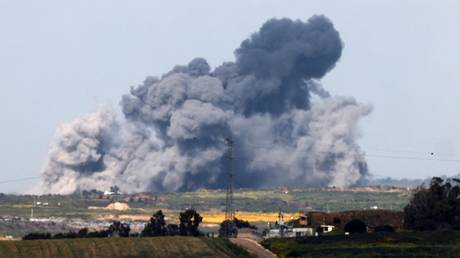 Hamas issues terms for permanent ceasefire with Israel – Reuters
Hamas issues terms for permanent ceasefire with Israel – Reuters
As reported by Reuters, which has seen the proposal, the Palestinian militants proposed the release of Israeli women, including female soldiers, children, the elderly and ill hostages, in exchange for Israel freeing between 700 and 1,000 Palestinian prisoners. Once the prisoner exchange is complete, Hamas said it would be ready to negotiate a date for a permanent ceasefire.
The Jewish state, however, dismissed the proposal and accused Hamas of making “unrealistic demands.”
On Thursday, Netanyahu also reiterated Israel’s determination to complete its mission of “eliminating” Hamas.
Israel’s decision to proceed with a ground incursion into Rafah comes after repeated warnings from the international community, including the US and Egypt, not to enter the city where some 1.5 million Palestinians are currently sheltering.
After Hamas militants launched a surprise attack on Israeli settlements last October 7, which saw 1,100 people killed and 250 taken hostage, Israel has been conducting a relentless siege on Gaza. According to the latest information from Palestinian health authorities, at least 31,341 people have been killed and 73,134 others injured in Israeli airstrikes and ground operations in the enclave over the past half a year.
-
Site: RT - News
Washington’s envoy accused Viktor Orban’s government of jeopardizing relations
Hungarian Prime Minister Viktor Orban is isolating his country from the Western “community of democracies,” US Ambassador David Pressman claimed on Thursday in wide-reaching rebuke.
Ties between the two nations should not depend on “temporary” leaders, the diplomat argued, as he delivered a list of grievances against Budapest.
“While the Orban government may want to wait out the United States government, the United States will certainly not wait out the Orban administration. While Hungry waits, we will act,” Pressman warned.
The ambassador was referring to Orban’s expressed hope that Donald Trump will defeat President Joe Biden in the upcoming presidential election.
Pressman’s speech was delivered at the Central European University (CEU) in Budapest, for an event dedicated to the 25th anniversary of Hungary’s accession to NATO. The private institution, founded in the early 1990s by George Soros, has faced a crackdown in Budapest, since Orban accused the Hungarian-born US billionaire of using NGOs to assert political pressure.
Read more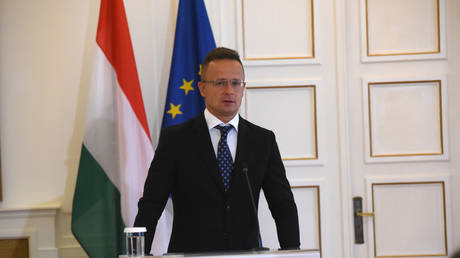 EU state blasts Biden’s ‘dictatorship’ remarks
EU state blasts Biden’s ‘dictatorship’ remarks
The fact that the CEU has relocated its main campus to Vienna, and “moved further to the west as Hungary opened eastward” is significant and “epitomizes the sacrifice of something great in exchange for… talking points,” the American diplomat claimed.
Budapest’s relatively cordial relations with Moscow and its refusal to follow the US lead on the Ukraine conflict were identified by Pressman as major points of contention. Hungary is ignoring the “legitimate security concerns” of the other 31 members of NATO and is “standing with Russia” by advocating a negotiated peace, he claimed, describing the latter as a call for Ukraine’s “surrender and subjugation.”
“This is not the approach of the Transatlantic alliance,” he insisted.
Pressman also blasted Hungarian politicians who use nationalist sentiment in domestic campaigning, and depict the US as a meddling foreign power. He called such remarks “wild rhetoric” and “dangerously unhinged anti-American messaging”, by Orban and his allies.
READ MORE: Top German government MP calls for end to Ukraine conflict
“We’re not really asking for much: transparency, dialogue, nonpartisanship, and a commitment to democracy would suffice,” the ambassador described what course correction was expected from the host nation. Washington requires NATO members to follow its lead on “big things” and is not objecting, even if they disagree on “most” other issues, he said.
-
Site: RT - News
Potential delivery of German-made Taurus missiles to Kiev could undermine Berlin’s own security, Sahra Wagenknecht says
Lawmakers across the German political spectrum who are considering delivering long-range Taurus missiles to Ukraine should realize that this would put the lives of millions of Germans on the line, veteran left-wing politician Sahra Wagenknecht has argued. The MP also pointed out to colleagues that this weapon cannot change the course of the Ukraine conflict.
Kiev has for months been requesting Berlin to supply it with the rockets, with Chancellor Scholz, however, repeatedly ruling out such a possibility. He has explained that Taurus’ long range would enable Ukraine to strike targets deep inside Russian territory, increasing the potential for further escalation. Scholz has also said supply of these missiles, which are made in Germany, would inevitably imply the presence of Bundeswehr troops on Ukrainian soil – a scenario that is “out of the question.”
While the German parliament did vote against arming Kiev with the missiles on Thursday, critics from the opposition as well as from within the ruling ‘traffic light’ coalition have urged Chancellor Scholz to lift the self-imposed prohibition.
Read more Top German government MP calls for end to Ukraine conflict
Top German government MP calls for end to Ukraine conflict
Addressing her colleagues in the Bundestag before the vote, Wagenknecht claimed that the “whole world outside of the German political bubble knows that Ukraine can’t win this war.”
“Taurus [cruise missiles] would not change anything at all there, the only [thing this] would change is that Germany would definitely become a party to the war in Russia’s eyes,” she explained.
According to the politician, who is also the leader of her party, what proponents of Taurus missile deliveries to Kiev are “carelessly toying with here is the security and, in the worst case, the lives of millions of people in Germany.”
Wagenknecht, who made a name for herself in German politics as one of the leaders of the Left party before leaving it last October, described as scandalous the fact that “German air force officers calmly debate how one can destroy Russian targets with German cruise missiles.” The MP was apparently referring to a leaked conversation between several German top brass made public by RT Editor-in-Chief Margarita Simonyan earlier this month.
In the audio, whose authenticity was later confirmed by the German Defense Ministry, the officers theorized about a Ukrainian strike on the Crimean Bridge with the help of Taurus missiles.
Wagenknecht has been a vocal critic of Scholz’s policies toward Russia over the Ukraine conflict since the start of hostilities in February 2022.
-
Site: RT - News
Nearly half of owners of virtual currencies in the US plan to vote for the former president, according to a Paradigm survey
Former US President Donald Trump appears to be the leading candidate among potential voters who are holders of cryptocurrencies, according to a recent survey conducted by crypto investment firm Paradigm.
1,000 eligible voters were asked about their relationship with virtual currencies and about their political leanings ahead of the upcoming November Presidential election, according to Paradigm, which published the results on Thursday. Of these, 19% stated that they have at some point bought crypto, with 7% saying they currently hold more than $1,000 in cryptocurrencies and 1% claiming ownership of over $10,000.
The results suggest that, out of the 161 million Americans registered to vote this year, there are currently over 11 million who own crypto and, for this group, policies regarding virtual currencies are important. That’s as 69% of voters stated that they were dissatisfied with the current financial system.
Of the crypto owners surveyed, 48% said they’d be voting for Trump and 38% for Biden. Notably, 43% of these voters recalled that they’d voted for Biden in 2020, while 39% had voted for Trump in that election. Paradigm is suggesting that these results could mean that Biden’s policies regarding crypto over the past four years may have lost him quite a few votes.
At the same time, Americans don’t appear to have much faith in either Democrats or Republicans when it comes to crypto, with 49% of survey respondents stating they have no trust in either party.
Read more Bitcoin hits new all-time high
Bitcoin hits new all-time high
“Large numbers of voters are looking for policymakers who can boldly light a path forward on crypto policy,” Justin Slaughter and Dominique Little of Paradigm surmised, in a blog post describing the results of the poll.
Earlier this week, both Biden and Trump officially secured their respective parties’ nominations for the election later this year, making them the two primary candidates in the presidential race.
While opinion polling has shown that American voters are not excited about a second Trump-Biden showdown, recent surveys have shown Trump leading his incumbent rival, with voters rating his performance in the Oval Office from 2017 to 2021 – particularly on the economy, crime, and border security – more positively than the rated Biden’s.
-
Site: RT - News
The Palestinian group said it will discuss a permanent ceasefire with Israel after the exchange of prisoners, the outlet has reported
Palestinian armed group Hamas is calling for an exchange of prisoners and the withdrawal of Israeli forces from Gaza as part of a ceasefire agreement, Reuters has reported after reviewing the document.
Early on Friday, Hamas announced on social media that it had presented its “vision” of a prisoner swap with Israel to Qatari and Egyptian mediators. The group said it made the move as part of talks aimed at “stopping the aggression against our people in Gaza, providing relief and assistance to them, and [facilitating] the return of those displaced [by the conflict].”
Reuters later revealed details of the Hamas proposal, which it said envisages a two-stage road-map toward ending the fighting.
In the first stage, Hamas stated it is ready to release Israeli women, including female soldiers, children, the elderly and ill hostages, in exchange for Israel freeing between 700 and 1,000 Palestinian prisoners, around a hundred of whom are serving life sentences, according to the agency.
Read more Netanyahu vows to ‘finish the job’ in Gaza
Netanyahu vows to ‘finish the job’ in Gaza
In line with the proposal, a deadline for an Israeli withdrawal from Gaza should be agreed following the conclusion of the first stage, Reuters said.
Hamas revealed it would also be ready to negotiate a date for a permanent ceasefire after the initial exchange of prisoners, it added.
According to the agency, the group wants all detainees from both sides to be released in the second stage of the plan.
However, the office of Israeli Prime Minister Benjamin Netanyahu downplayed hopes of an imminent ceasefire on Friday, saying in a message on X (formerly Twitter) that Hamas continues to produce “unrealistic demands.
Netanyahu insisted on Thursday that Israel will complete its mission of “eliminating” Hamas. In order to do so, he stated that Israeli forces will enter Rafah on Gaza’s southern border with Egypt, which has become the last refuge for more than a million displaced Palestinians.
At least 1,100 were killed and 250 taken hostage when Hamas carried out a surprise incursion into Israel on October 7. Many of the captives were released by the group during a week-long truce in November, but Hamas is still believed to be holding around 130 people.
READ MORE: UN report finds Israel deliberately targeted journalists – Reuters
The latest information from Gaza’s health ministry suggests that at least 31,341 Palestinians have been killed and 73,134 others injured in Israeli airstrikes and ground operations in the Palestinian enclave over the past half a year.
-
Site: RT - News
The head of the Social Democrats in parliament, Rolf Mutzenich, said it is time to stop thinking only in terms of how to “wage a war”
It is about time Germany shifted its deliberations toward winding down, freezing and ending the Ukraine conflict, the head of the ruling Social Democratic Party in the German parliament has argued. Rolf Mutzenich also defended Chancellor Olaf Scholz’s staunch refusal to provide log-range Taurus missiles to Kiev.
Russia has repeatedly stated that it is open to peace negotiations in principle. Earlier this week, President Vladimir Putin said Moscow was “ready for serious negotiations” that would be based on today’s “realities” and include “security guarantees for the Russian Federation.”
Speaking in the Bundestag on Thursday after lawmakers voted against arming Ukraine with Taurus rockets, Mutzenich said: “Isn’t it about time we talked not only about how one wages a war, but also thought about how one can freeze and later also end a war.”
He also criticized those in the ruling ‘traffic light’ coalition, which also encompasses the Green and Free Democratic parties, who oppose Chancellor Scholz’s stance on potential Taurus missile deliveries. Mutzenich charged that “all sense of measure is gone within the coalition.”
Read more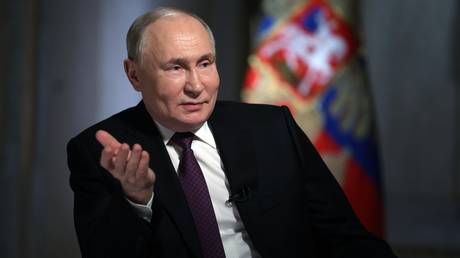 Putin outlines terms for peace talks with Ukraine
Putin outlines terms for peace talks with Ukraine
German Foreign Minister Annalena Baerbock, who called on her government on Monday to “intensively consider” the potential delivery of Taurus cruise missiles to Ukraine, shook her head and was visibly displeased when she heard these statements, local media have reported.
The opposition Christian Democratic Party rebuked the head of the SPD bloc in parliament, with one lawmaker dismissing the suggestion of freezing the conflict as “unbelievable.”
Andrey Melnik, who served as Ukraine’s ambassador to Berlin between 2015 and late 2022, also chimed in. The diplomat, known for his controversial remarks and the use of obscene language when addressing German officials, wrote on X (formerly Twitter) that he has “always said: this guy was and remains the most obnoxious German politician. Forever and ever,” referring to Mutzenich.
Addressing lawmakers on Wednesday, Chancellor Scholz insisted that the delivery of Taurus missiles was “a line that I don’t want to cross as chancellor.” He explained that such a shipment would inevitably require the presence of German military personnel on Ukrainian soil – a development that is “out of the question.”
While Kiev has been asking Berlin to supply the rockets for months, German authorities have stressed that the weapon’s long range would enable it to strike targets deep inside Russia, including Moscow and St. Petersburg, potentially exacerbating the conflict.
The Kremlin has consistently warned that by supplying Ukraine with weapons, the West is merely prolonging the conflict without affecting its outcome. -
Site: RT - News
The UK needs to make “tough choices” to be able to counter the “threats” posed by Russia and China, Richard Dearlove has said
Britain is engaged in a “gray war” with Russia, but neither the authorities nor the public are taking the situation seriously enough, the former head of the famed spy agency MI6, Richard Dearlove, has warned.
The UK military isn’t getting enough money to be able to counter the “threats” posed by Moscow and Beijing, Richard Dearlove, who led the British Secret Intelligence Service between 1999 and 2004, said in an interview with Politico on Friday.
The statement followed last week’s announcement of the UK’s budget for the next financial year, in which there was no increase in defense spending. It remains at 2% of the country’s GDP.
”If you stopped anyone in the street here in the UK and asked them whether they thought Britain is at war, they’d look at you as if you were mad. But we are at war — we’re engaged in a gray war with Russia, and I am trying to remind people of that,” the former spy chief said.
The British authorities have “got to make some tough choices, and I’m afraid the tough choices are in front of us right now. We should be spending at least 2.5%” on defense, he insisted.
Read more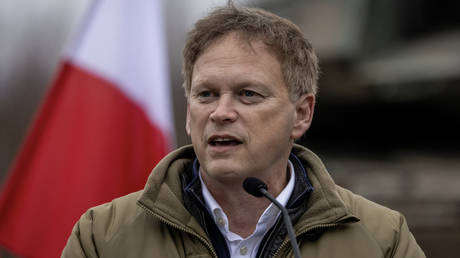 West poses no threat to Russia – UK defense chief
West poses no threat to Russia – UK defense chief
“We urgently need to be building more ships. We need a much bigger navy. And we need more boots on the ground, for God’s sake,” Dearlove stressed.
The fighting between Russia and Ukraine has shown the importance of manpower on the modern battlefield, the 79-year-old said. The size of the British army had been reduced by more than 26,000 since 2006, and currently has just over 74,000 full-time troops.
Last month, Kremlin press secretary Dmitry Peskov accused the UK of being “directly involved” in the conflict between Moscow and Ukraine. He was reacting to a report in The Times which claimed that the head of the UK armed forces, Admiral Tony Radakin, had “helped the Ukrainians with the strategy to destroy Russian ships and open up the Black Sea.” According to Peskov, it is “no secret” for Moscow that the British “provide different forms of support” to Kiev such as “people on the ground and intelligence.”
In February, Russia’s Foreign Minister Sergey Lavrov said that the UK has been “even more aggressive, more elaborate in its provocative assertiveness” towards Moscow than any other Western nation during the conflict.
READ MORE: Putin issues warning on US troops in Ukraine
The UK has been one of the leading backers of Ukraine in Europe since the start of the fighting more than two years ago, pledging to provide Kiev with 12 billion pounds ($15.2 billion) in overall support, including 7.1 billion pounds ($9 billion) in military assistance.
-
Site: RT - News
No ally will be able to trust Washington if Kiev falls, Josep Borrell has claimed
A Ukrainian loss to Russia would hurt Washington’s credibility as a security provider, the EU’s High Representative for Foreign Affairs and Security Policy Josep Borrell has warned on a visit to Washington. Kiev can’t wait for the presidential election in the US to get more aid, he added.
Borrell spoke to the press on Thursday, after meeting senior US officials, including Secretary of State Antony Blinken. He stressed that Ukraine badly needs additional assistance, which is currently blocked in the US House.
“The next months will be decisive. Many analysts expect a major Russian offensive this summer and Ukraine cannot wait until the result of the next US elections,” Brussels’ top diplomat said.
A Russian victory in the conflict “will have enormous repercussions for America and for the system of alliances built around the US and Europe,” he added. Should that happen, “no country could be sure anymore” that Washington would “come to help any ally” under attack.
Read more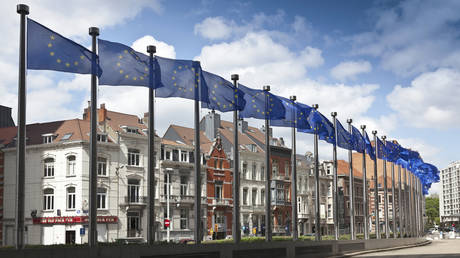 EU members oppose plan to arm Kiev with Russian money – Politico
EU members oppose plan to arm Kiev with Russian money – Politico
Since Ukraine is not a NATO member, the US is not bound by any obligation to defend it. US President Joe Biden has pledged to help it fight Russia for “as long as it takes” to prevail. Last year, Ukrainian forces attempted to launch a major counteroffensive using Western-donated heavy weaponry, but failed to score any significant territorial gains.
Amid Kiev’s battlefield failures, the issue of continued aid has become embroiled in US partisan politics. The Republican-controlled House has blocked Biden’s request for an additional $60 billion in assistance, with speaker Mike Johnson arguing that the White House was unable to present a convincing strategy for achieving victory in Ukraine.
Borrell pledged the EU’s continued military support for Kiev, but said the US needed to pull its weight too.
Moscow perceives the Ukraine conflict as a US-led proxy war against Russia and has stated that it is risking far more than the West.
READ MORE: US has created ‘Frankenstein’ states – British MP
“For us it is a matter of life and death; for [the US] it’s a matter of improving their tactical position [globally and in Europe],” President Vladimir Putin reiterated in an interview this week.
However, no Western weapons provided to Kiev can change the outcome of the hostilities, Russian officials have claimed.
-
Site: RT - News
The Taiwanese defense chief has confirmed US troops are training the island’s army, with some stationed 10km from mainland China
US special forces personnel are stationed on some of Taiwan’s outlying islands training its armed forces, the island’s defense authority chief Chiu Kuo-cheng confirmed to the press on Thursday.
The official was asked to confirm media reports of a permanent US army presence in Taiwan on the sidelines of a legislative hearing, the news website Focus Taiwan wrote on Thursday. Chiu stated that US service members are training Taiwanese troops, helping them identify weaknesses and blind spots.
Last week, the US military news site Special Operations Forces Report (SOFREP) wrote that America’s “Green Berets” were planned to be deployed to Taiwan to act as permanent training observers and prepare the island’s special units. This represents a departure from past practice that saw frequent but non-permanent visits by US personnel to Taiwanese training facilities, the report said. The permanent US forces, according to the article, would be situated on the Kinmen Islands, just 10 kilometers from mainland China.
Read more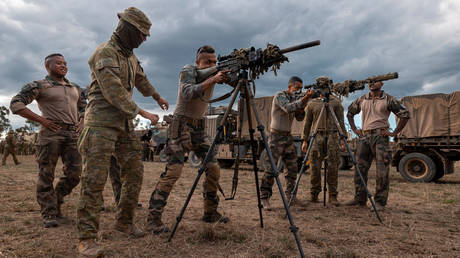 US has built up military stash for potential Taiwan war – Reuters
US has built up military stash for potential Taiwan war – Reuters
Beijing sees the self-governing isle as part of China’s sovereign territory, and has repeatedly warned it against formally declaring independence. Although Taiwan has governed itself since 1949, most of the international community, including the US, does not officially recognize it as a sovereign state.
While the US does not officially support Taiwanese independence, it maintains security ties with the island. Under the ‘Taiwan Enhanced Resilience Act 2022,’ to “deter People’s Republic of China (PRC) aggression against Taiwan” the US is authorized to spend up to $2 billion a year in military grants to bolster the island’s security up until 2027.
Read more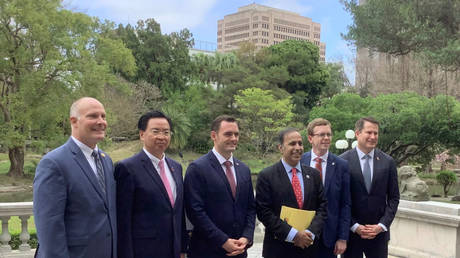 Taiwanese leaders fret over US commitment to Ukraine – media
Taiwanese leaders fret over US commitment to Ukraine – media
Mainland China has slammed the increased rotation of US military personnel to the island. The US always prioritizes its own interests, and Taiwan is merely a “pawn” it uses against mainland China, Beijing’s spokesman Chen Binhua stated on Wednesday. He claimed that by “closely aligning with the US to carry out so-called military training programs,” Taiwan’s political leadership is gradually “pushing the people of Taiwan into a crisis.”
“Any attempt to seek ‘independence’ through military means or rely on external forces for ‘independence’ will only lead to danger and ultimately result in self-destruction for Taiwan,” he warned.

